M-systems a digital theory of everything 1.03
M Systems
A Digital Theory of Everything
Go to IndexBy Nick Ray Ball 19th August 2016
M Systems is a vast universe of business vs physics comprising of 16 different individual concepts, which are currently written in over 2 million words and created as the Villa Secrets web framework.
If one knows M-Theory one will understand how a set of varied stand-alone systems can combine to create a theory of everything and that’s as good an introduction as any. If one does not know M-Theory please appreciate Professor Stephen Hawking’s opinion:
M-Theory is the only candidate for a complete theory of the universe.
M-Theory is the unified theory Einstein was hoping to find.
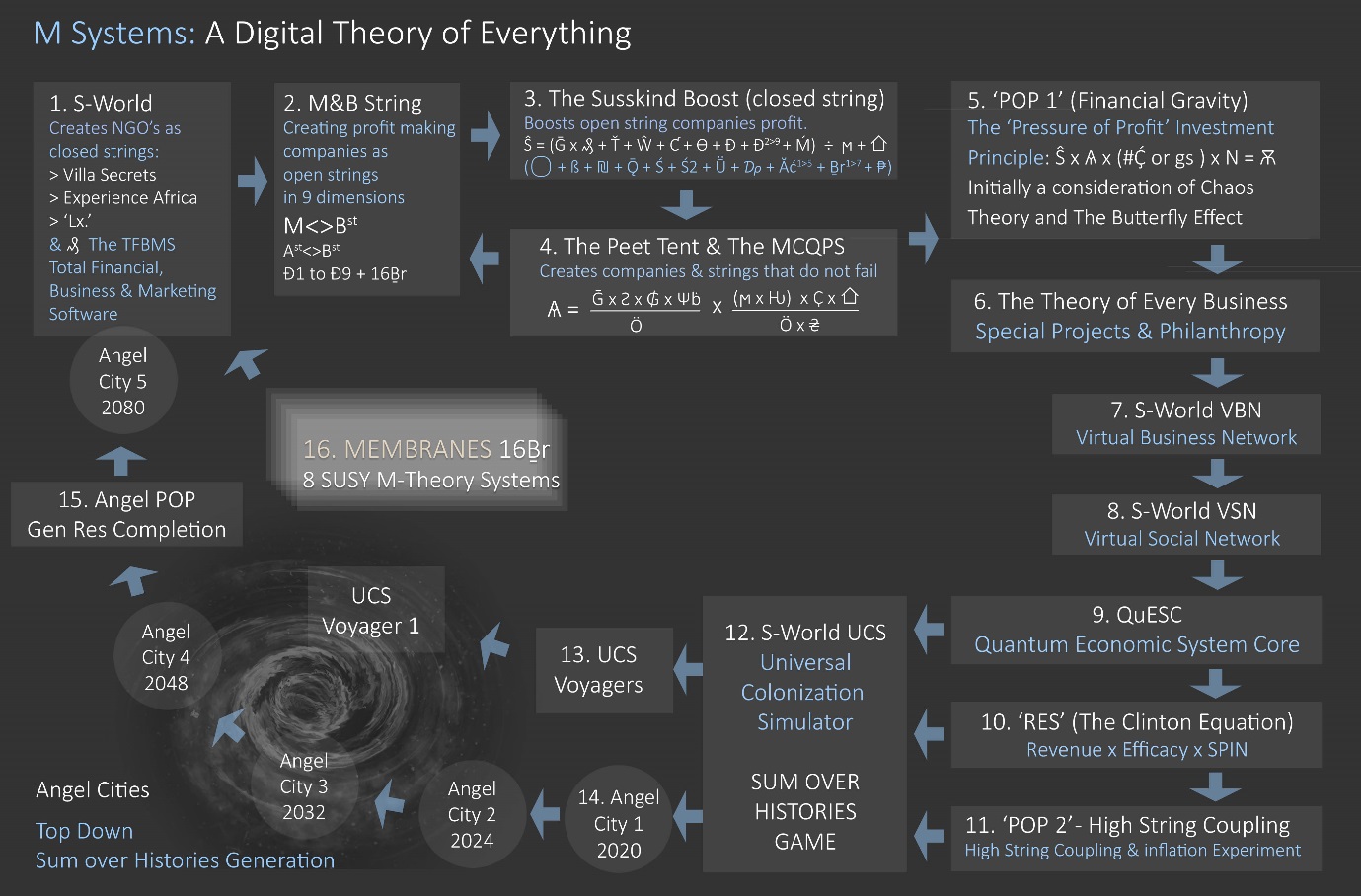
Index
- System 1. S-World, the Villa Secrets Web Framework & The TFBMSM
- System 2. The M&B String (M<>Bst) (A<>Bst)
- System 3. The Susskind Boost
- System 4. ‘The Peet Tent & The MCQPS.’
- System 5. POP 1 ‘The Pressure of Profit Investment System’ (Financial Gravity)
- System 6. The Theory of Every Business (Written in 2012)
- > Chapter 1. Economics, S-World & the Core Network
- > Chapter 2. The Suppliers Butterfly
- > Chapter 3. The Theory of More Than We Know Now
- > Chapter 4. The Locations Butterfly
- > Chapter 5. Economic Stimulus and Investment
- > Chapter 6. Facebook Business Development
- > Chapter 7. S-World
- > Chapter 8. S-World UCS (Universal Colonization Simulator)
System 1. S-World, the Villa Secrets Web Framework & The TFBMS
Network / Web Framework / Financial / Business / Marketing / Software
The S-World Global Network design, created in theory in 2011. Now created in the real world as ‘Villa Secrets.com,’ Villa Secrets is a web framework that is far simpler to use than WordPress. To the point that a complete non-web person can create a page in 30 minutes, that currently takes our top designers 3 hours to make in WordPress. Within a year, the entire site will be CMS driven and can be duplicated for thousands of companies, who would add their own inventory.
Having created the basic design in 2011 we are excited to be starting work on the TFBMS (Total Financial, Business & Marketing System) explained in detail at Network.VillaSecrets.com. The main difference between 2011 and now is that in 2011 we had a plan to hire developers to make this. But now we are the developers. And this fact alone, that we are making software for ourselves and there is no disconnect, is just one of many reasons why this system will ‘rock the word.’ And not just in travel and real estate.
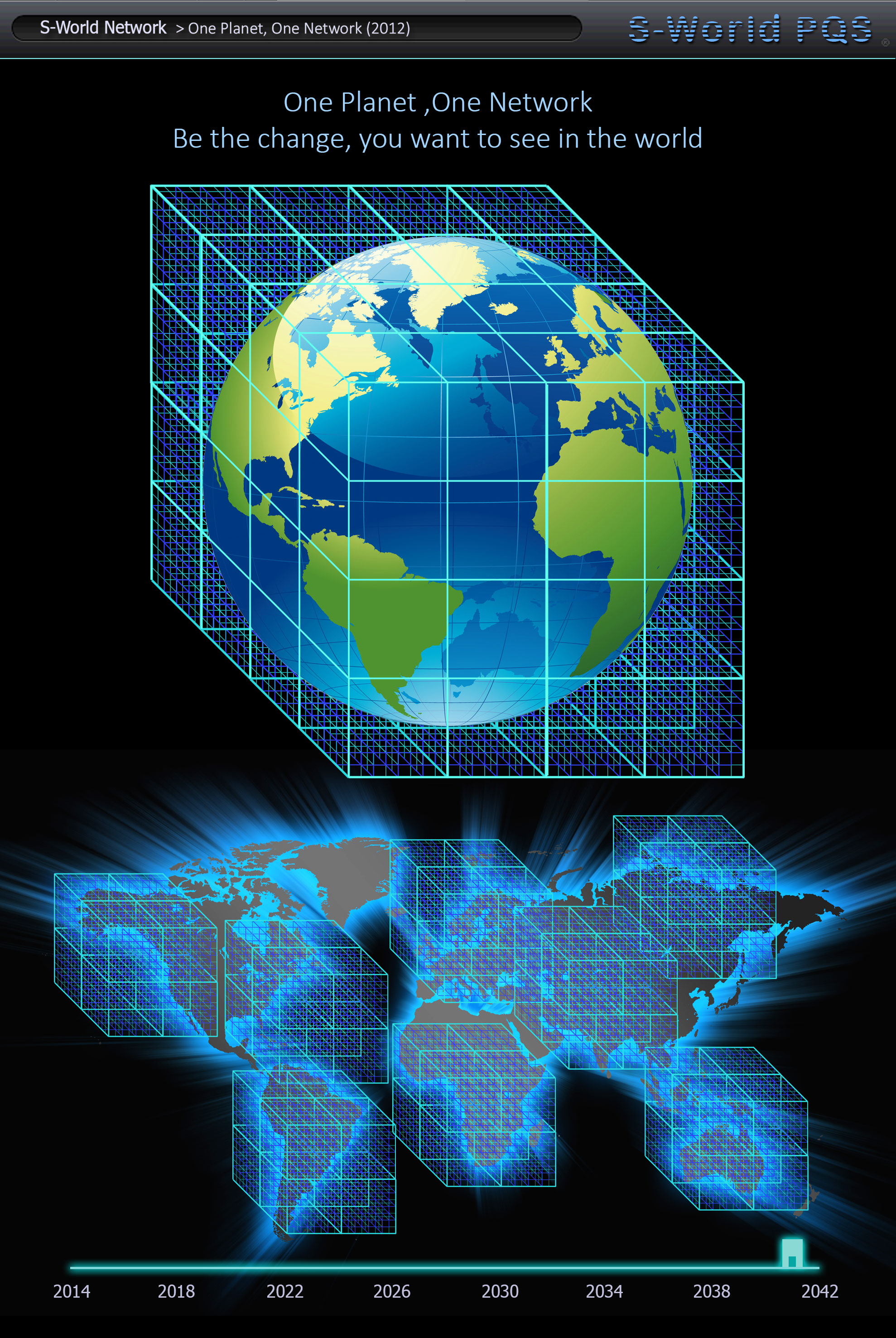
System 2. The M&B String (M<>Bst) (A<>Bst)
String Theory / Business / Networking / The Butterfly Effect
M-theory was born out of string theory in 1995 by Professor Edward Witten. In terms of physics it is a set of mathematics that unifies Einstein’s theory of gravity (general relativity) with the physics that powers everything digital quantum mechanics. This unification is known as ‘The Theory of Everything.’ It can’t be proved right now cos the strings are very small. However, its mathematics is far from theory. It is the most economical mathematics ever created, how it has emerged that over the last 40 years no one has used this mathematics in business and economics baffles the mind!
We start the S-World network as a set of 8 companies, and apply to those companies ‘string like’ behaviour. We look for the advantages (ways to increase profit) one company has on another, and another, and another… At this point, if the companies we want to join the string, do, there are hundreds of advantages and only a few disadvantages.
We write these advantages like so: A53⇔B57⇔C60⇔D42⇔E44⇔F62⇔G61⇔H63.
The number representing the amount of advantages created from the rest of the companies in the string. Note the symbol ⇔ is the symbol for iteration, the creation of feedback loops, circular events &‘economic butterfly effects.’
System 3. The Susskind Boost
String Theory / Business / Software
When Lennard Susskind discovered String Theory he thought he would be highly praised. When he was not, he got drunk. I know that feeling, I thought in 2013 my book The Network on a String would see me highly prised and when it did not, I got drunk. And did not think of physics again until earlier this year
However when I re-watched Lennard Susskind’s video: ‘Lecture 1 – String Theory and M-Theory’ (at 34 Mins.) I found something that was so in tune with the way we were creating the network/system that brought in higher math back into the equations and from that point on its been a roller-coaster.
Here is the paraphrased quote:
‘We boost the hell out of the system, until every single part has a huge momentum.
If there is any part that is going backwards, you just have not boosted it enough.
Just boost it more until it’s going forward with a large momentum.’
Don’t be scared of the math, this is just algebra (which they teach to 12 year olds).
Ŝ = (Ḡ x ₰+Ť + Ŵ + Ƈ + Ѳ + Ð1 + Ð2>9 + Ḿ) / (ϻ+ ⌂)
It looks so complex as I wanted to use characters that I had not seen used by others. But it’s very simple, it’s all about different ways to boost the system
Ḡ is gross profit achieved from Google AdWords x ₰is the +/-45 different effects created by the TFBMS. After which we add the effects of other boosting methods such as methods Ť (tenders or agency contracts) and Ŵ (additional websites).
Once we have added all the boosting methods we need to allow for the law of diminishing returns so we divide my ϻ (available market share) and ⌂ (access to stock).
We use this math to assist us with creating future projections, but there is another important aspect. To most the S-World Villa Secrets looks like a franchise, with a set up fee and a +/- 4% franchise fee. However, this is not the case. S-World Villa Secrets is being converted into an NGO, it makes no profit. It only works for the benefit of its members (the companies who join the network)
Where this 4% goes is boosting, and seeing as 4% of income is about 25% of gross profit, that’s a lot of boosting. We will see how this works in more detail and how we simulate a theory of everything in the following point.
System 4. ‘The Peet Tent & The MCQPS.’
String Theory / General Relativity / Quantum Mechanics
The Peet Tent is named after Dr Amanda Peet, a previous student of Leonard Susskind. Of all the work presented in ‘The Network on a String’ (2013) one point played with my subconscious, and it is probably due to this point that the plans for Villa Secrets emerged the way they did. The point was from the lecture Sting Theory for the Scientifically curious (at 51 mins). In which Dr Peet explains how when using a string Feynman diagram due to its elasticity and flexibility it mathematically account for any possible uncertainty created in quantum mechanics. Unifying the smooth certain mathematics of general relativity with the impossibly uncertain mathematics of quantum mechanics
At the time I drew this…
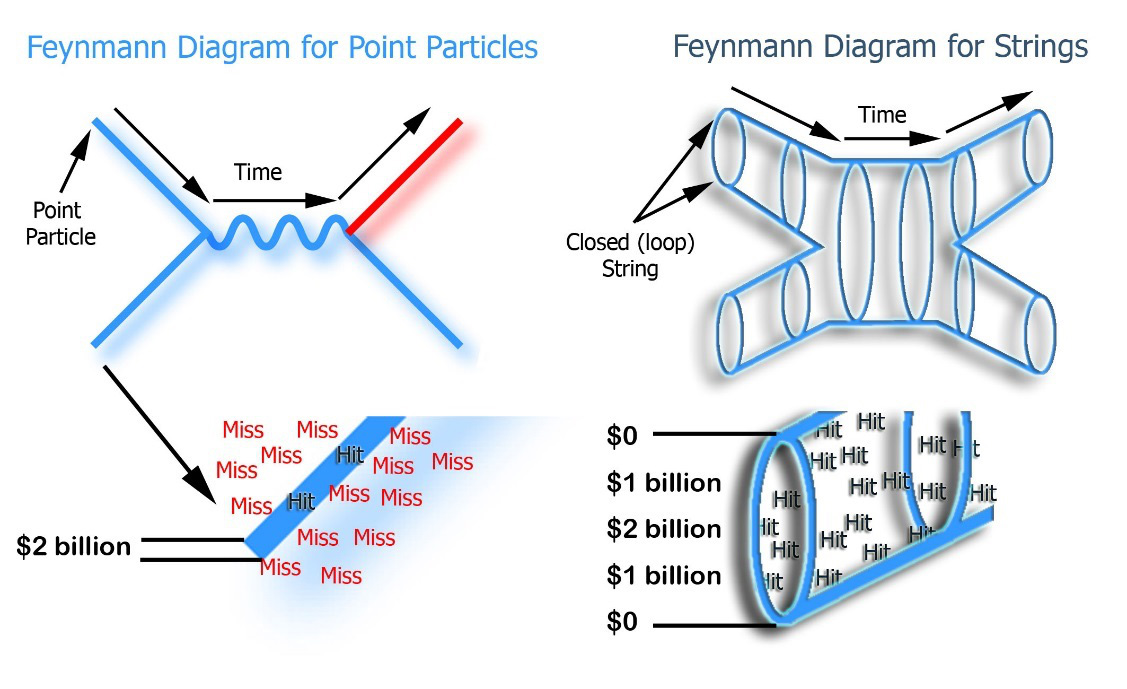
Now this was not right, but it was on the right track…
Now we have really simplified this into just some simple principles that we apply to the ‘Susskind Boost.’ Which if we remember receives 25% of the gross profit of each company in the string.
What we do is consider the Susskind boost itself is a string, (a closed string) and by changing the shape of the string, we can account for any possible outcome.
Here are some different shapes
I. Initial company boost. (Note Professor Susskind makes a note that the smaller a string is the harder it is to boost, so we always boost new companies as much as possible).
Initially all the money a company contributes is used to boost that company in a way that is specified before the start of operations.
II. Full string boost
All 8 companies in a string contribute to the boost, and the system decides the best way to boost the string as a whole.
But, the two weakest companies in the string continue to use their own contributions to boost their own companies.
This is important the companies that are doing well are boosted by development. The development of the TFMBS and M-System, so they will in theory just get stronger and stronger. By paying extra attention to the weakest we are always strengthening the weakest points. S-World economics often looks at strengthening the weakest points.
III. Weak Company
Here is where we start to see the Amanda Tent in action.
If a company in a string starts making a loss, even after it has used its own contributions to boosting itself, then money from the collective contributions made from the other companies in the string are used to add additional boost/marketing to the loss making company.
‘If there is any part that is going backwards, you just have not boosted it enough.
Just boost it more until it’s going forward with a large momentum.’
And whilst this is only a small point, it was a eureka moment at the time. As it answered a question I was thinking about in general network terms. And that was if in this scenario do we give the company a bail out or do we put money into more marketing for it. It’s a tricky one, however on hearing the ‘we just boost it some more’ from Professor Susskind, I know we had to boost it not bail it out. And indeed it was that exact thought that created the name ‘The Susskind Boost.’ And brought string theory back into the S-World hemisphere.
IV. Broken Company
This scenario is rather hard to imagine given the safeguards we have. Such as that of monitoring every cent of every company, the TFBMS, M Systems and having a termination of contract rule for companies that get themselves into untenable legal trouble (the client gets eaten by lion scenario).
However, should a company find itself in dire states, all the money generated by the rest of the string can be diverted to assisting the flagging company.
Given the safeguards and if only one company in the string was failing, the 25% of gross profit from the seven successful companies is far more than what could the broken company would require. This creates the ‘Peet Tent.’
Depending on the performance of the winning companies the Peet Tent could accommodate up to five failing companies. But seeing as it’s a hard task for one company to fail, given the systems and safeguards, and barring an ELE (Extinction Level Event) the probability of five companies failing at the same time is so low. It can be effectively ruled out by an action similar to normalization (a key factor in quantum mechanical experiments).
V. Broken String
Ok, so what if an ELE does occur, what then?
Well, let’s say it was a localised ELE that would have the same devastating effect but only on the local population. Let’s say a Tsunami took out Cape Town.
And let’s forward the clock to 2020, at which time we would be very disappointed not to have full strings in LA, Bali & St Tropez.
In this case, the contributions to the Susskind Boost would be used from international strings to bail out Cape Town (Note I just found an area where a bail seems necessary).
The other strings and the rest of the other strings in the world would collectively afford for the owner of each company and their 3 key staff to carry on surviving, locally or abroad.
The latter point ‘locally or abroad’ is expanded upon in the later section ’11 POP2 High String Coupling’
The Peet Tent Part 2. The MCQPS
The second part of this system is the MCQPS, which is Monte Carlo Effect Probability Software. This is one of the safeguards mentioned earlier that make sure companies do not fail in the first place, and it’s an integral part of The Peet Tent.
Monte Carlo Effect Probability Software is used to increase the blast of a nuclear reaction, by accounting for every possible outcome and making sure the reaction, reacts. Since 2012 this has been a part of the M-System Design, but instead looking to create low and high financial forecasts based on every possible outcome.
This is for minds greater than mine to implement as it is very hardcore quantum mechanics. Which we will not get into here other than to note that if one looks to interpret the Heisenberg uncertainty principle from quantum mechanics to business and economics, one may simply consider that one way to increase the probability of a financial forecast being correct (or higher) is simply to lower the forecast. And whatever margin of error we create for year 1 will double in year 2 and double again in year 4.
However, since this concept I have changed the way forecasts are created instead using the lowest probability of each effect of the TFBMS points, (which is more like how I expect the MCQPS system works in physics)
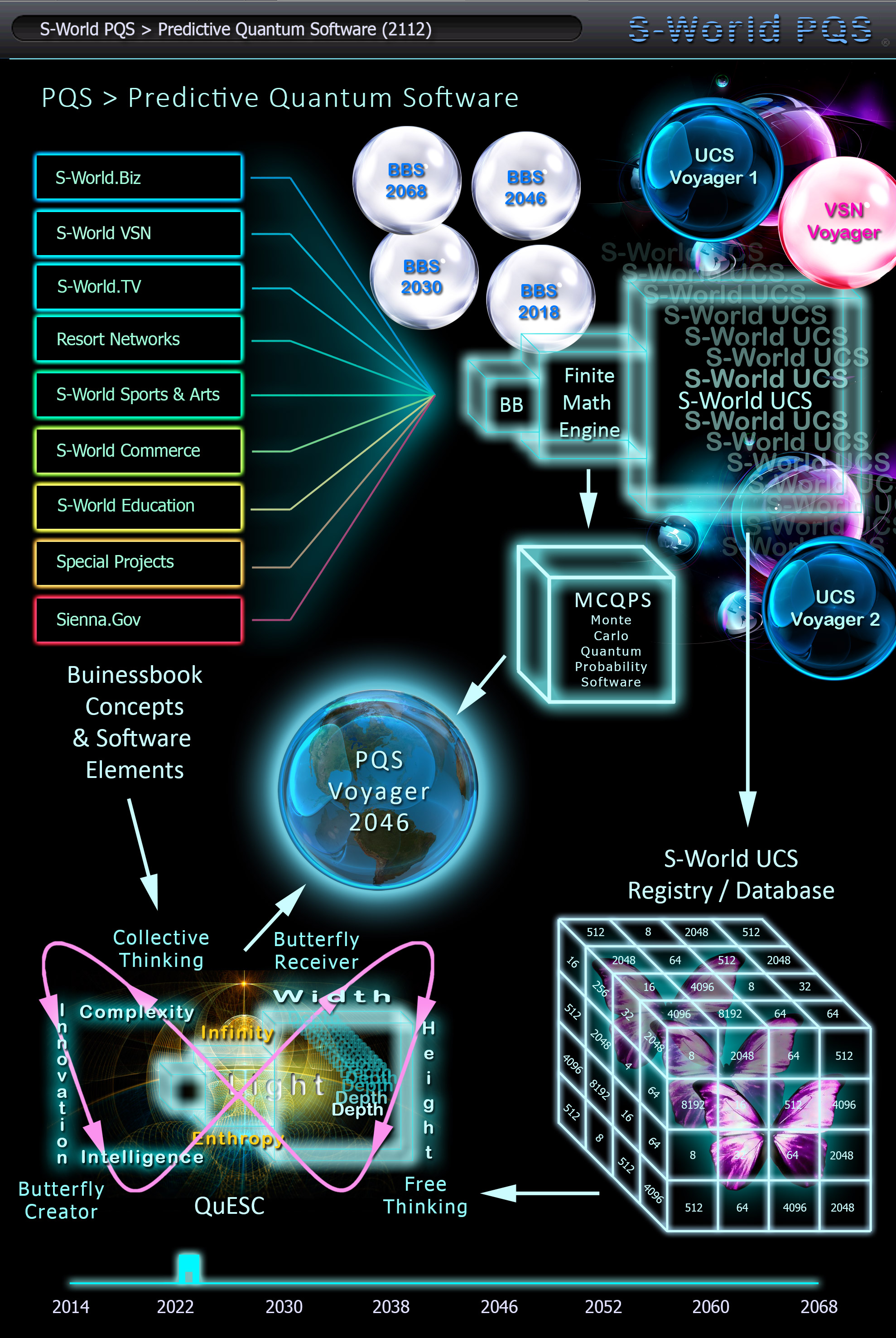
System 5. POP 1 ‘The Pressure of Profit Investment System’ (Financial Gravity)
The Butterfly Effect / Chaos Theory / Quantum Mechanics / Newtonian Space / General Relativity
POP was probably created instinctively. Starting at the age of 18 when I bought a Roland W30 sampling and sequencing keyboard which began at 12-year career in music programming. In which I spent most of my time programming the mathematics of music in 8 bars divided into 4 subsections. After which I swooped careers to web design using Macromedia Flash which used the exact same system, but for animation. This took me to 2004 and the creation of the world’s first Virtual Tour using the software.
Skip forward to another 7 years and working on the S-World economics www.S-World.biz. And a desire to solve the chaos theory problem of rounding errors creating infinite numbers with computer systems, as small differences in initial conditions (such as those due to rounding errors in numerical computation) yield widely diverging outcomes for systems that evolve over time, rendering long-term prediction impossible.
In research I came across the butterfly effect and had been considering the saying
‘Does the flap of a butterfly’s wing in Brazil create a typhoon in Texas?’ To which I had a consideration of how to measure the flap of a butterfly’s wing and so determine if it did or did not cause a typhoon in Texas.
A cube was imagined around the butterfly that measured the change in energy in the air created by the flap of the butterfly’s wing. Then more cubes were imagined all around the world. In which the change of energy was measured from cube to cube all the way to Texas at which point one could assess if the flap of a butterfly’s wing did or did not cause the typhoon.
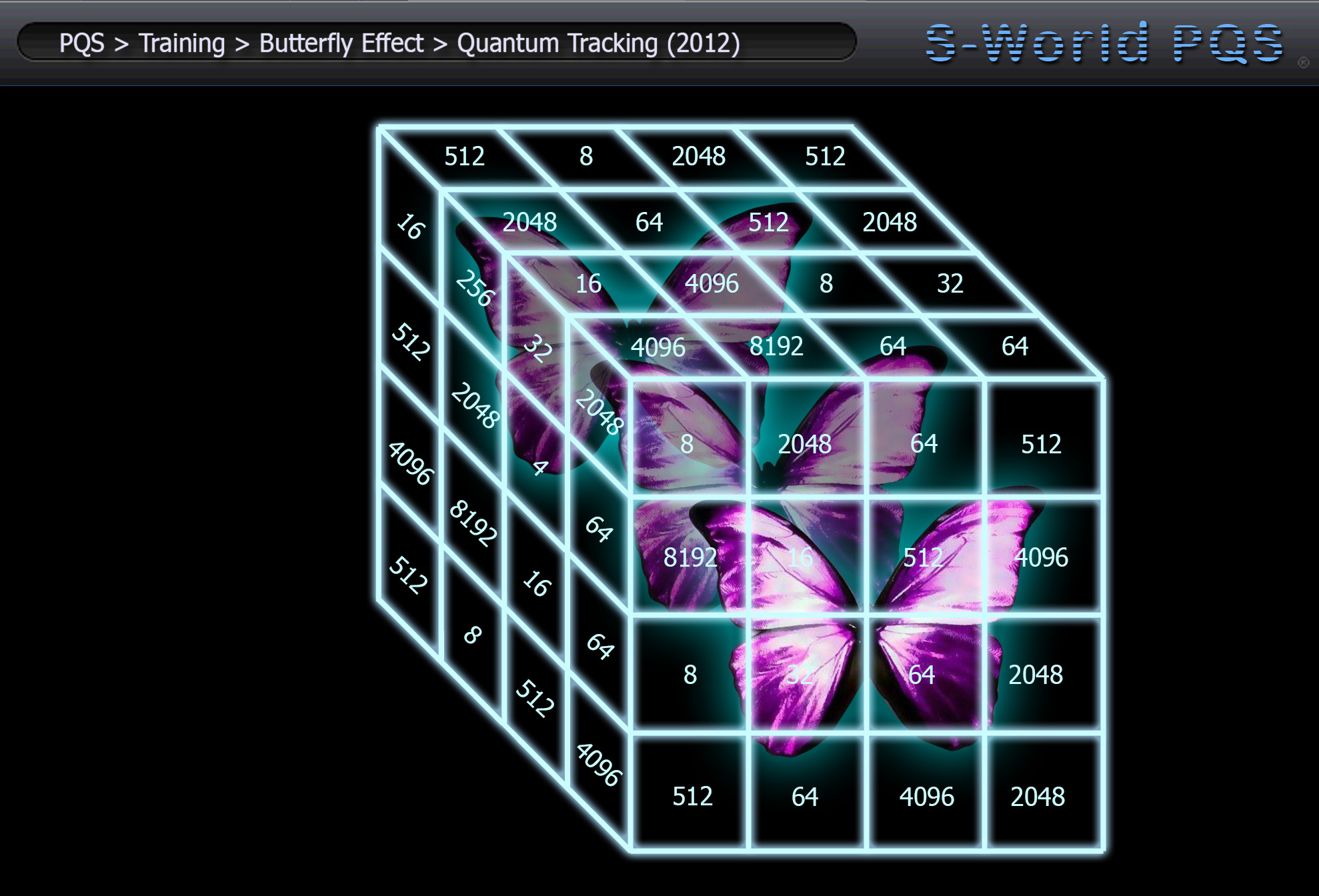
Above we see the basic principle. Albeit there would be a great many more sections of the cube and a lot more cubes.
It was not realised at the time but this solution was in itself a Theory of Everything of sorts. As the only way to accurately measure the energy inside and at the edge of each cube was to use quantum mechanics and having many such cubes encircling the earth was similar to general relativity (or at the least, Newtonian Space).
With the idea of cubes of energy in mind, the next idea was to transfer that principle to the companies and economics of the S-World network.
The concept was to create stable exact cubes of profit that could be measured precisely. However, how on earth can one expect to create a specific amount of profit for one company in a year, let alone many companies?
So instead of all the profit in a year we pick a point of profitability. It is a point that would be deemed highly satisfactory for the owner or owners of the business, which is more than enough to make it competitive. And due to the business software and boosting mechanisms in the Susskind Boost it could be easily reached.
Once the business achieved this point of profitability, all additional profit would overflow into a fund to create a new business. To simplify we considered the system as made of ‘buckets.’ Once the first bucket is full, if for instance a bucket held $1,000,000 in profit, as soon as the company made more profit, the additional profit overflows into a new bucket.
The real significance of this process was only realised when committing the principle to paper, and the creation of the graphic we see below.
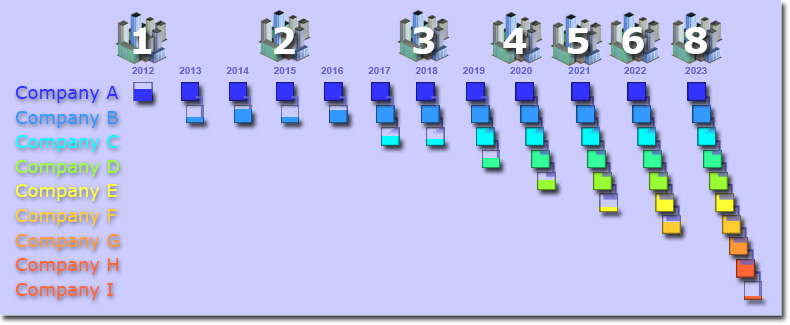
As whilst at first it took a number of years for this system to create a second company (to fill the second bucket), as time went on and there were more companies working together filling the next bucket, so new companies were created faster and faster.
The above effect coined the phrase ‘The Pressure of Profit’ as the greater the pressure the faster growth would occur.
This is the basics of POP, which would go on in theory to create the investment for the macroeconomic project ‘American Butterfly’ part 1 ‘The Theory of Every Business.’ After which parts 2 ‘Spiritually Inspired Software’ and 3 ‘The Network on a String’ followed the math to a global system.
I first thought to count our POP buckets, by doubling them, so 2 > 4 > 8 > 16 > 32 > 64 > 128 and so on. This generated results that were harder to create recurring numbers. However, in evolution this idea gave way to the concept of creating cubes of POP profit. 1 > 8 > 64 > 512 > 4,096 > 32,768…
One can see how they fit below dimensionally, where 1 is the first Cape Town string of 8 companies, fits inside a second dimension of 8 cubes (64 companies), then 64 and 512.
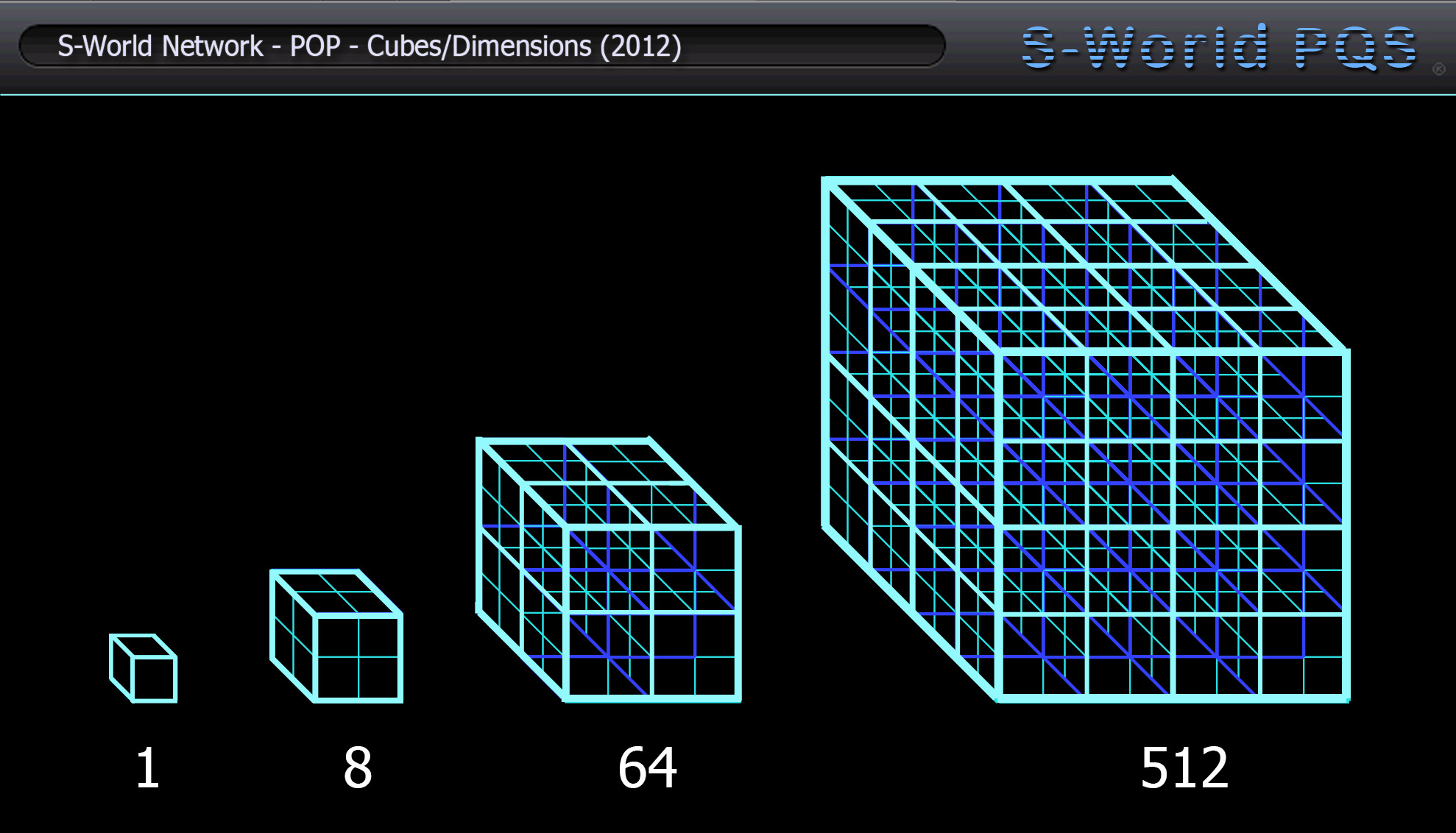
This leads to the initial calculation that the global network would be confined to 32,768 grand network cubes. Which would be sub divided into 8 continental cubes each containing 4,096 grand networks.
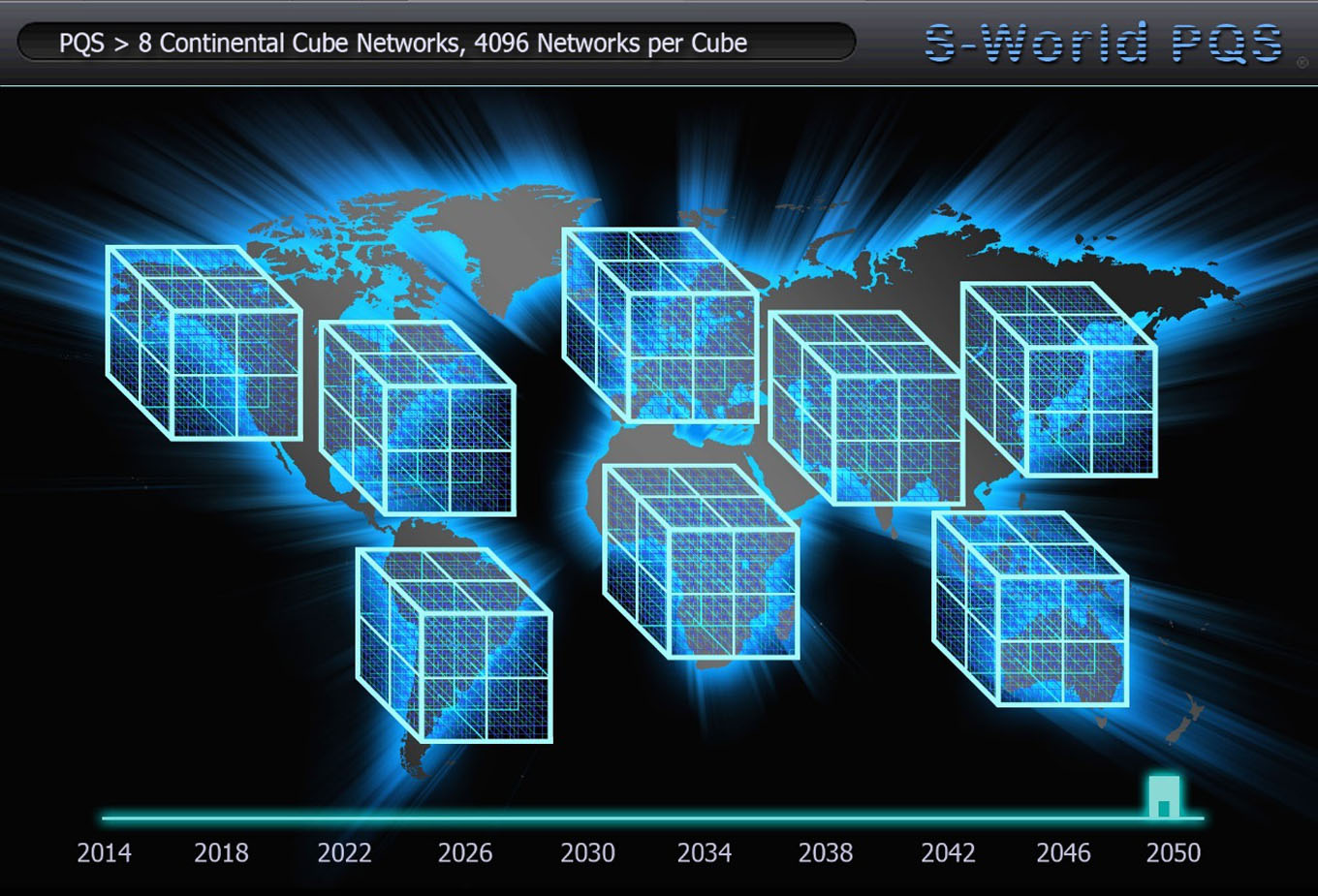
However, the graphic above is not as I would wish to see it presented. I would rather see the cubes circling the globe, creating a simulation of sorts of Newtonian Space. Creating the best simulation we can make of gravity which when described and illustrated by physicists such as Brian Greene, Newtonian Space is pictured in a simulator way. See ‘The Fabric of the Cosmos 1 of 4 What Is Space’ from 7 minutes
I am working on a way to upgrade Newtonian Space to General Relativity. However, this is a work in progress and like the MCQPS needs minds finer than mine to assist the process.
We can see a graphic that shows the global cube in a way closer to how I want to see it. Below we see that the BABY POP cubes have not reached their optimum POP point. But the green and gold cubes have exceeded it and are now investing into and creating many new companies and cubes in other locations.
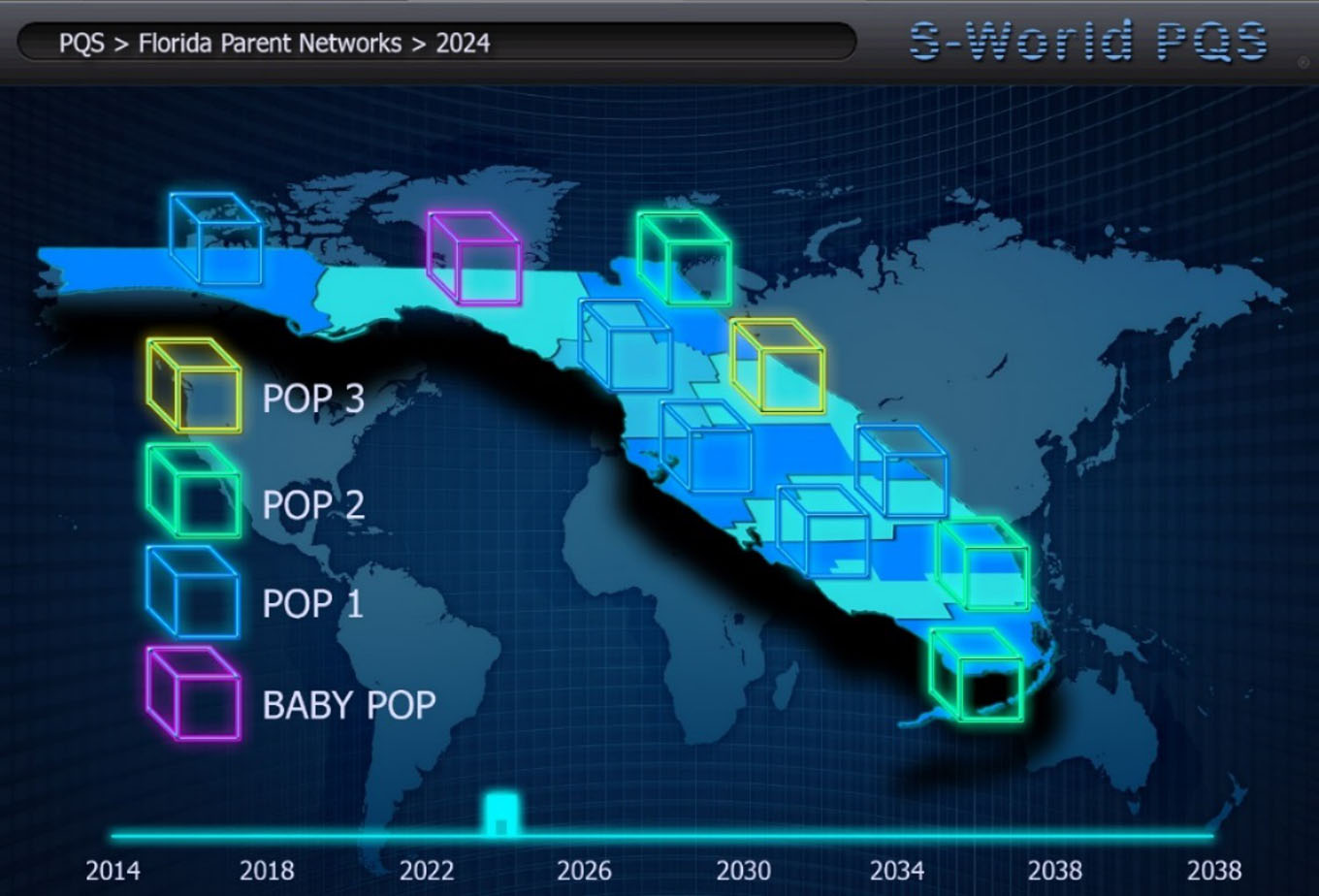
Practically (In The Now)
Not to get carried away with the 2011 to 2013 theoretical economics. POP is a very useful part of the current S-World Villa Secrets founding string.
The POP point will be set at about the point where the initial contribution paid by the first network company owner is created in shareholder profit each year for the owner (or possibly earlier if desired by the company owner).
Currently the initial contribution is ZAR 3,200,000 ($240,000). And so when the company owner is making $240,000 a year in shareholder discretionary profit (what he gets in his pocket), whatever additional profit is generated is used via POP method. Currently there are two different POP investment options. Firstly, is investment into a large resort development which is detailed in the next point. Secondly is investment into creating a new company in a new string in a new location.
The model is that POP investment will pay for 50% of the initial contribution of a new company. For instance, BaliLuxury.Villas, the balance being provided by the new owners/CEO of the company, which given a 50% deposit, the Susskind Boost and the Peet Tent making it almost impossible for the company to fail, will be available as a low interest loan to anyone with a half decent credit rating.
This being so one can pick from a whole host of potential candidates. And as this would be happening at about 2020 the TFBMS would be highly developed so we would expect the new company to in turn reach its POP point in 2 years not three.
Despite paying 50% for the start-up costs the initial investor from the first company only owns 25% of the company. This is due to the work load, ergo the new CEO will be doing all the work and the investor will do very little, or even nothing.
However, we will see in point 11 ‘POP 2’ High String Coupling how the investor can end up owning stakes in thousands of companies, indeed the potential for growth of the initial investors is so high that we need to limit the maximum amount of income the shareholder can make to $100 million. As it is not S-World’s mandate to create a new breed of super rich.
For the initial investor it’s a great opportunity and not just the long term pay day. Firstly, there is the safety net. Should Cape Town get hit by the previously mentioned tsunami, the owner and his three key staff can go live in Bali and work or just take a break.
The other very sting point is the law of diminishing returns we apply in the Susskind Boost my ϻ (available market share) and ⌂ (access to stock). If a company and string gets to its POP point it will have done well and would have collectively massed about 25% of markets share.
This is the point where the Susskind Boost tells us that it will be far harder to get from 25% of Market share to 50% in Cape Town than it will to get from 0% to 25% in Bali, or LA which is our current focus for the second string.
System 6. The Theory of Every Business (Written in 2012)
Economics / Business / Resort Developments / Networks / Software / Quantum Time
There is an awful lot to The Theory of Every Business, not least the +/- half million words of logistics fond in the later chapters of S-World.biz.
The basic principle was the solution of how to expand the S-World network from luxury travel and real-estate into other businesses. And in a eureka moment it occurred that we could expand the operation centre/campus into a resort town, where after we would network with first the building companies and suppliers, so we only give tenders to such companies that join our network. And later as the development is created all the companies who open shops or businesses that trade from the resort town would all be a part of the network. Using versions of the TFBMS and the Susskind Boost tailored specifically to their industries.
An important note is that each development needs to produce a greener carbon footprint after being created or needs to buy 100 times the shortfall in preserving vulnerable rainforests.
The Theory of Every Business was written in 8 chapters.
a. Chapter 1. Economics, S-World & the Core Network
Read/Download the full chapter on PDF
Looked at the long-term debt to GDP ratio problem with the US economy and presented a solution. That we would build many such developments and each would house a hospital and provide for the citizens. Having created the Kobayashi Maru GDP game, this solution seemed to be the best/only way to fix the problem, without the US having to eventually impose draconian austerity.
After this introduction we presented some of the key points of the S-World network including the S-World Virtual Business Network
b. Chapter 2. The Suppliers Butterfly
Read/Download the full chapter on PDF
The Suppliers Butterfly invented a token company, from the building industry called ‘The Window Factory.’ In which it would supply the windows for the resort development. And due to such tender and the effects of the TFBMS become profitable enough to contribute to POP.
In addition to the TFBMS the company was also aided by the early version of what is now the M&B String (M Systems Part 2). This is by looking for feedback loops and circular events which we mapped over the outline of a butterfly.
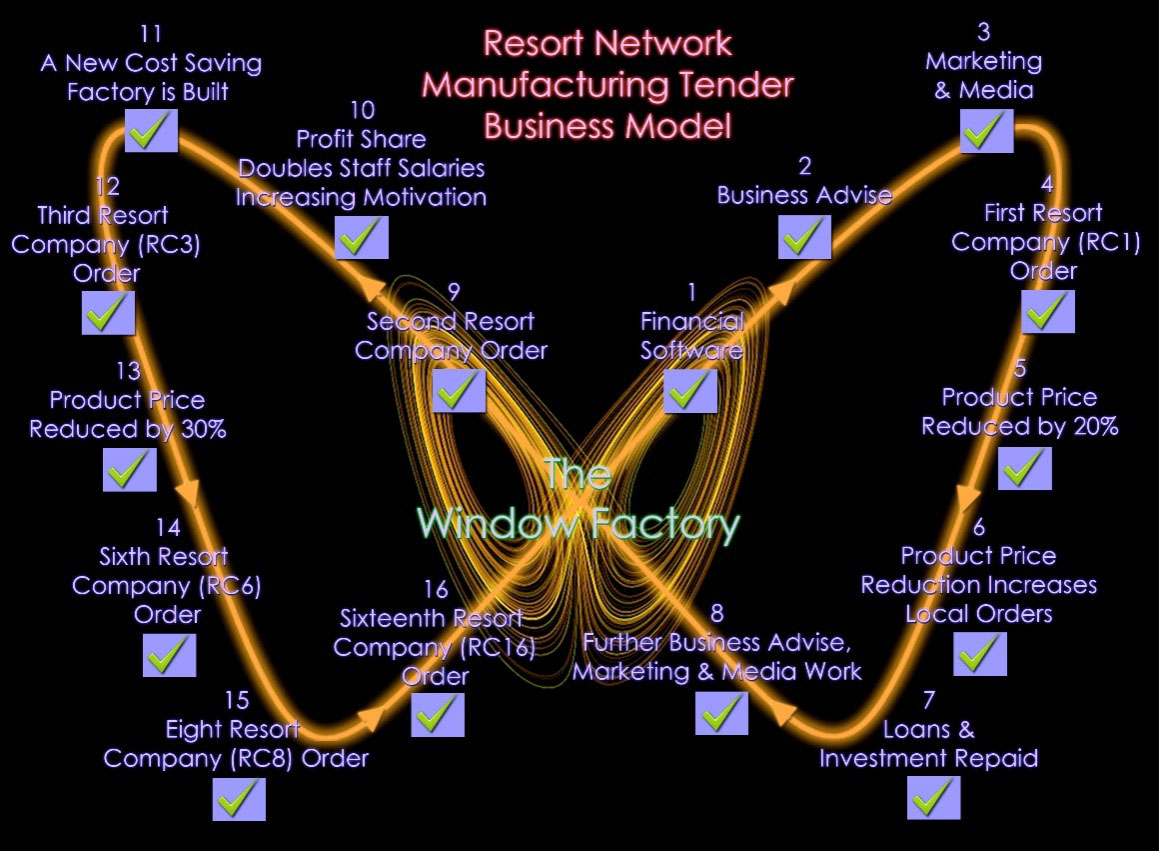
c. Chapter 3. The Theory of More Than We Know Now
Read/Download the full chapter on PDF
Chapter three is where the magic happens. And it is the reason why I have made S-World Non Profit. As I look at life more in terms of winning the Chaotic Earth Game’ (doing something significant) as opposed to just the accumulation of wealth.
At the time of writing (2012) the initial plan was that the POP money would be used mostly to fund philanthropic and ecological initiatives. However, this would not go down well with investors. So now we have a better solution, that being as soon as a company in POP, the 25% of gross profit that was destined for boosting, is instead used to fund philanthropic and ecological initiatives.
In chapter three we look at some ways in which the creation of the resort development itself is for the greater good.
i. Universities and Spartan Contracts
Improves research and education for all and create educational contracts for unskilled workers that after 16 years see them as well educated house owners.
ii. SURH’s Super University Resort Hospitals.
It takes a lot of resort developments to achieve. However, the primary reason for the addition of SURH’s is to absorb the US government Medicaid and Medicare costs, which is pretty much the only way to stop the USA from going bankrupt. An essential action, as without America, there cannot be an American Butterfly.
Cost savings are generated by looking to do deals with pharmaceutical companies to lower medical costs. To develop pharmaceuticals and medical technologies in the universities and in general a lowering of staff costs as most doctors and nurses will be trained via Spartan Contacts.
With the above being so, income from those in and near the resort that could afford medical care will be a significant contribution to funding via POP. A few thousand resort developments and outreach projects and the burden of Medicare and Medicaid on the US government would be absorbed. And the same system can bring health care to other countries that have no such benefits in the first place
iii. Alternate Energies.
Simply that the resorts would be powered by green energy, mostly large solar arrays. And in addition the idea to not allow residents petrol driven cars. An initiative that now 4 years later with the work of engineers like Elon Musk and Tesla Motors is realistic. Indeed, we are considering creating the first development in a way that if one buys an apartment, house, villa or mansion then a Tesla car or cars are included in the purchase price.
The creation of the above three points generates another circular event. As a green resort development with jobs, excellent universities and hospitals, it becomes a more desirable location. These increasing the desirability, this increasing the cost of the properties sold.
d. Chapter 4. The Locations Butterfly
Read/Download the full chapter on PDF
The locations butterfly looked at 16 different initiatives. Why the careful planning of a resort development would make it a success. And real estate along with communal property would be sold at a premium after it becomes a desirable place to live and vacation in.
d.i. Resort Towns
d.ii. Economically Planned, Plenty of Jobs
d.iii. Shopping Malls, Marinas & Downtown Areas
d.iv. Super University Resort Hospitals
d.v. University Towns & Good Schools
d.vi. Golf Courses, Lakes & Botanical Gardens
d.vii. Luxury and Affordable Housing and Subsidized Rentals
d.viii. Business Centre, Exhibition Hall & Conferencing
d.ix. S-World Architecture & Urban Planning
d.x. Sports Village & Global Leagues Structures
d.xi. Rezoned Land for an Ecological Improvement
d.xii. Powered by Alternate Energy
d.xiii. The Disney Effect
d.xiv. The Hollywood Effect
d.xv. The World Cup Draw Effect
d.xvi. Brand Love and Quite a Story
All of which are well considered with a lot of prior research in S-World.biz
However in the here and now we are immediately focusing on point 9 S-World Architecture & Urban Planning. As will be presented in the next point in M-Systems ‘Point 7 S-World VBN (Virtual Business Network).
What we missed out at the time was that the creation of the Villa Secrets network, by always recruiting a top estate agent in the world’s most luxurious locations, created a very powerful platform to sell the resort development off plan in the first place.
e. Chapter 5. Economic Stimulus and Investment
Read/Download the full chapter on PDF
This chapter starts with a retrospective note
(Retrospective Note: With the creation of the RES Equation (now the Clinton Equation) and further development of Economic Stimulus, some of the following has now been superseded, it is, however interesting to see the initial development of “Economic Stimulus.”
We shall look at the Clinton Equation in M Systems part 10. But the basic principle of economic stimulus is to create a network credits system so staff bonuses and many transactions business make are not in cash, rather in network credits. In which need to be spent on goods, properties and services created by the other network company.
By controlling how the network credits are spent one can economically stimulate any particular network company, string or grand network.
For instance, if a staff member is given the equivalent of $50,000 in network credits under the condition that 50% need be spent within 2 months within the resort network the staff member is in, it stimulates the local network economy and gives the retail and service companies in the resort development an additional boost. And a big one…
Chapter 5 was also an early version of the TFBMS and the Susskind Boost. Creating a list of boosting mechanisms, that would be applied to each company.
The chapter concludes with some early investment ideas. However these ideas have now changed due to the Villa Secrets macroeconomic model and M System part 16 ‘Membranes’
In addition comes an outlandish initiative to talk with the Congressional Budget Office. And the other leading economists such as Ben Bernanke, who’s bleak outlook on the USA’s future due to over borrowing was the reason for the Theory of Every Business’ Medicaid and Medicare initiative and present M System. And suggest that if the US government were to borrow an additional trillion dollars to create 1000 resort networks it would be to their great benefit.
f. Chapter 6. Facebook Business Development
Read/Download the full chapter on PDF
Facebook business development is best now considered at the Theory of Every Business applied to retail.
Facebook can use it if they desire. However, the plan for Facebook is to be a significant part of one of the 16 different S-World universes. As is presented in M-System point 16. And in addition is a significant part of S-World VSN M-System Part 8.
It terms of the chapter at hand and the Theory of Every Business for retail, we pick up the script at the point ‘Lx.’ which is the luxury goods and services network (multiverse). What Villa Secrets is to real estate ‘Lx.’ is to other expensive things one can buy.
Not told in this chapter but presented in American Butterfly part 4 ‘The Butterfly.’ Is the intention to re popularise the wealthy person’s lavish spending as doing so will greatly increase global GDP, as we see later in the Clinton Equation.
To encourage such lavish spending ‘Lx.’ is designed as a member only club, only accessible to persons of high net worth or high earnings. The club will offer luxury goods made by S-World companies at a better price than can be found in retail outlets or on line.
The chapter goes in to present a plan for retail outlets (well a Facebook retail outfit) but the model would be any department store, where it only offers the top 10% of goods (rated by customer feedback). However, the big factor is the economic stimulus mentioned earlier which on top of standard trading is enough to create a highly profitable business.
The chapter then goes back to 2011 and S-World.biz’s New Sparta development, the pre cursor to American Butterfly.
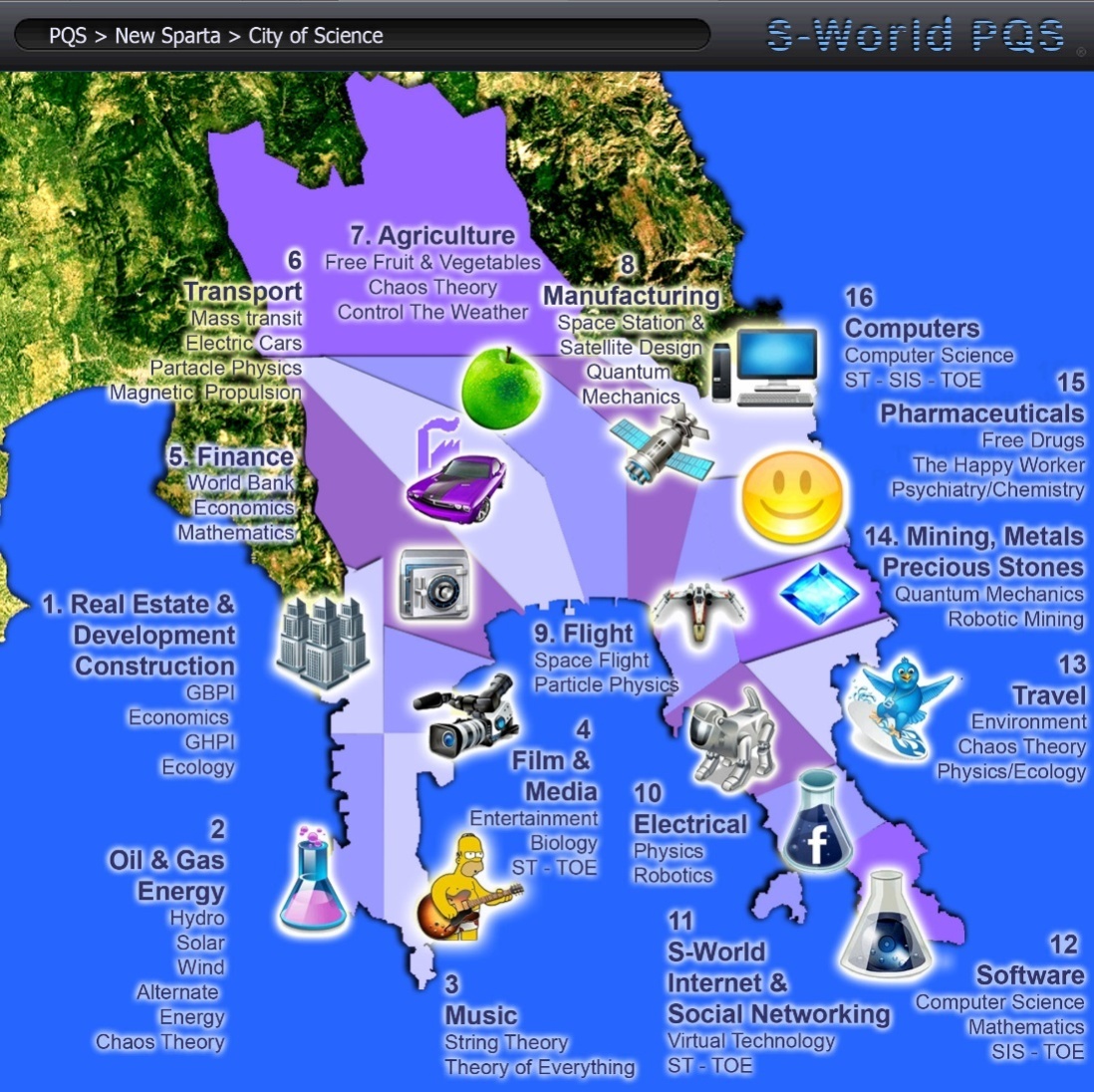
g. Chapter 7. S-World
Read/Download the full chapter on PDF
We shall start this chapter summary in the same way the original chapter started as it presents the inspiration for S-World and M-Systems.
Sienna’s World
S-World is an abbreviation for Sienna’s World named after my daughter the most beautiful baby in the world. I know, every father says that about his daughter but one has to admit she’s a cutie. On informing my father about the make-up of the business and networking software plus my decision to name it after Sienna, he came up with a rather pertinent acronym.
As the environment the SIENNA software lives in is to be a Virtual World, the word “World” was added thus resulting in making Sienna’s World, shortened to “S-World.” Within S-World’s Virtual World, Sienna will appear as an Angel helping to bring attention to specific items of interest.

In this chapter we look at some or the original software concepts, and it is mentioned:
‘At best they are a collection of super summaries. As each page you are about to read requires a book all to itself. Then one needs to put all those books together. Much like the economics within American Butterfly, the construction of the software is circular, with each component adding versatility and strength to the others.’
It begins with S-World VSN, which is now M System part 8. And as it is described in detail a little later we shall just look at the introduction
S-World VSN is the oldest concept within American Butterfly. It began in 2000, and by 2002 my company had developed the world’s first commercial mapped Virtual Tour for popular internet usage. Where one zooms in on animated maps, clicks on scenes or buildings to look at 360-degree movies, and from where one could book accommodations.
The 2012 update changes the 360-degree movies into 3D renderings that can be accessed, walked into, or encircled.
The next section presents S-World VSN, which is now M System part 7, as this is the next section we shall just present a snippet…
S-World VSN (Virtual Social Network) sees the creation of a Virtual World that mirrors real life. The simplest explanation would be to consider Google Maps in 3D, where instead of just looking down at a 2-dimensional flat image, one adds the dimension of height so one can walk under bridges, into houses and swim in bodies of water.
If one has played the Sims, one will already have a good picture. Indeed the Sims and Pixar are desired as primary partners in S-World VSN. If one has not seen the Sims, please consider any computer game where a player’s avatar can move. Or consider a recent animated film; imagine you can pause it, then pick a character and direct the character around the animated environment.
The “Hook” to S-World VSN is the “Teleport to GPS” function; it does not take a million ideas to make a great product. Indeed, often it is best to have just one and then build the product around the idea.
The chapter then goes into detail about how one can locate a friend and your avatar can jump into the virtual network where one can virtually see all that your friend can see, virtually.
Next is S-World VSN TV, in which we postulate how the band U2 spent their day before a rock concert in Cape Town with S-World VSN camera crew.
‘Partly due to promotion, partly as they like to interact with their fans, but primarily because Bono wishes to raise money for the residents of the Mandela Park Township, U2 agreed to spend the day before the concert in S-World VSN interactive mode. They turn their cell phone VSN locators to exact positioning and allow a small film team to follow their movements, with one camera filming the band and two others taking artistic shots of the location and scenery.’
After breakfast, U2 takes a 20-minute boat ride to Robben Island, where Nelson Mandela was incarcerated in the Apartheid years before being released to become president. Bono has a few words to say upon arrival at Nelson’s actual cell and the band members chat and discuss the journey. At any time, one can click on the “more info” button and bring up documentary footage about Robben Island, Nelson Mandela, or Apartheid history.
After 90 minutes and an amusing incident with a penguin, it’s back to the mainland and the decision as whether to walk or get the cable car to the top of Table Mountain. Partly out of curiosity and in part as a collection of S-World, some viewers have pledged money if Larry Mullen takes a walk. Larry walks while the rest of the band takes the cable car. This works perfectly for the S-World film crew because it provides more entertainment for VSN viewers as they have two focal points: Bono, The Edge and Adam in the cable car. Shortly after taking in the view, and possibly having a drink, viewers watch as Larry tackles Platteklip Gorge.
There is a certain camaraderie that comes with climbing Platteklip Gorge. And it would not be a surprise to find Larry bonding with his camera-carrying counterparts which makes for a much better one-to-one S-World VSN experience, particularly as they chat away on the frequent rest breaks that come between the continuous and unrelenting track up to the top. Larry has the opportunity to talk face to face with his sponsors, which of course makes for more interest and so brings more donations. For some it takes 45 minutes, the average time being two hours. Larry and the S-World crew made it in 90 minutes, which is a noteworthy time, and the $10,000 or so Larry have raised will undoubtedly assist the residents of “The Mandela Park” township.
At any time, S-World VSN viewers can switch between actual footage of their journey and the virtual view. Once the band is reunited, it’s on to the next leg of their journey. To the Mandela Park Township, 10 miles as the crow flies, 45 minutes via cable car then road, or two and a half hours on foot, going down from Table Mountain across the 12 Apostles down to Constantia Nek. So their cell phones out and the band watches a 5-minute virtual journey of the more adventurous route. Two and a half hours down is a lot easier than 90 minutes going up, so the band, including Larry who has now reached hero status with those following his day, all take the scenic trail to Constantia Nek before heading into Hout Bay and the Mandela Park Township.
Once at the township all the band members go into interactive mode. Choosing to speak to various VSN viewers regarding the township as they walk around and meet the largely Malawian and Zimbabwean population who, despite their living conditions, are extraordinarily upbeat and for the most part happy. During this process the charity drive is increased and by the time they leave, fifty thousand dollars or so has been raised for the residents. Now it’s back to the hotel and on to the concert.
During the concert, one can simply choose to watch it in standard TV mode, or interact with the audience who are periodically being interviewed. If one knows someone in the audience, one can request they go to a VSN camera for a live chat. Alongside this, one can choose to view the concert from any specific TV camera, swooping from different angles at will.
Lastly, each person who uses VSN has an Avatar that can appear on screen, either a simulation of themselves, or an animal or indeed anything one may care to be. The avatar can go wherever it wishes; for example, if the avatar happens to be a kangaroo, the option to jump on stage and bounce around with Bono and the band during the concert is available.
End of Extract
Next comes S-World VBN, The Virtual Business Network, (described in greater detail soon) and the application is travel and real estate to better show client’s properties.
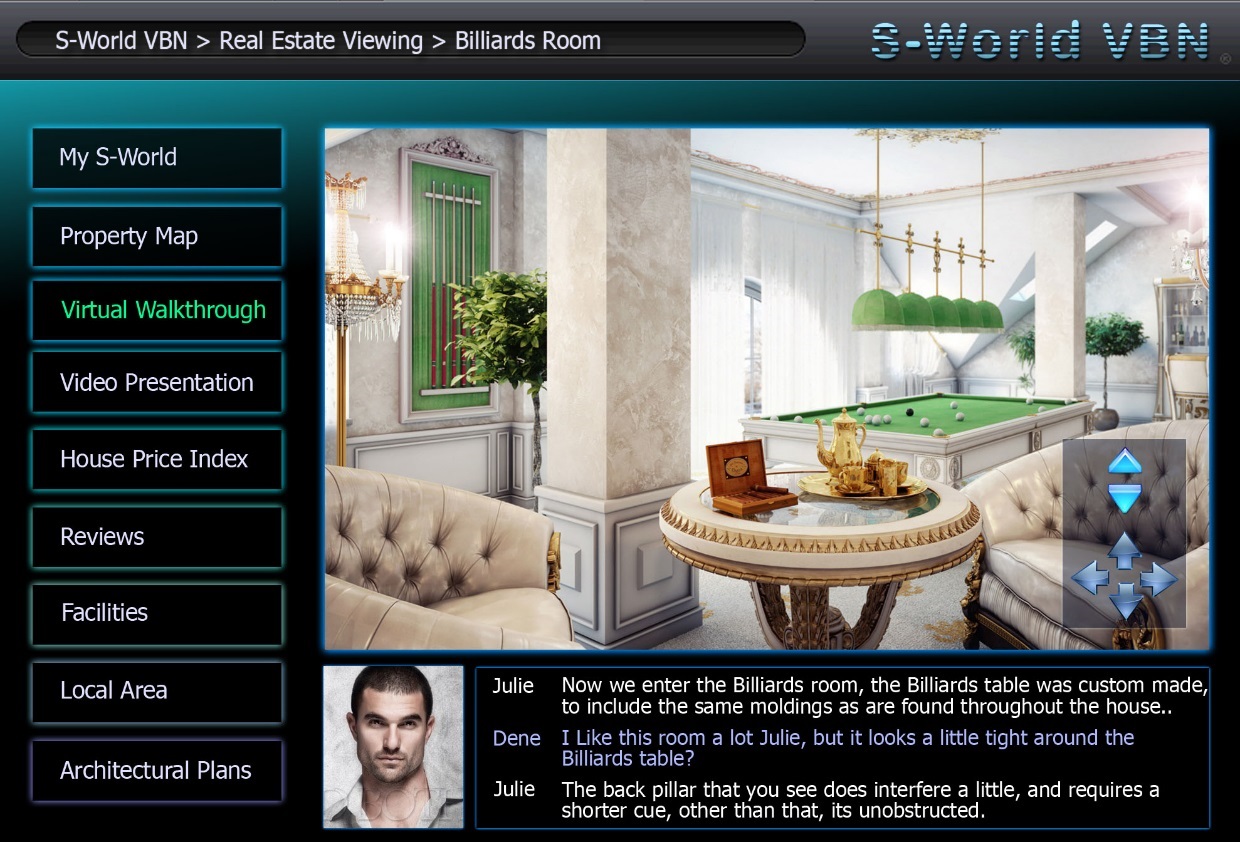
What you see above is not supposed to represent a 2d virtual tour, which are now commonplace. This is a 3D virtual tour, where one can walk into all rooms, see the view from different windows and even see what is in the fridge, a significant upgrade on a 2D virtual tour.
The chapter follows with some early graphics of how the TFBMS (Total Financial, Business & Marketing System) combines with S-World VSB
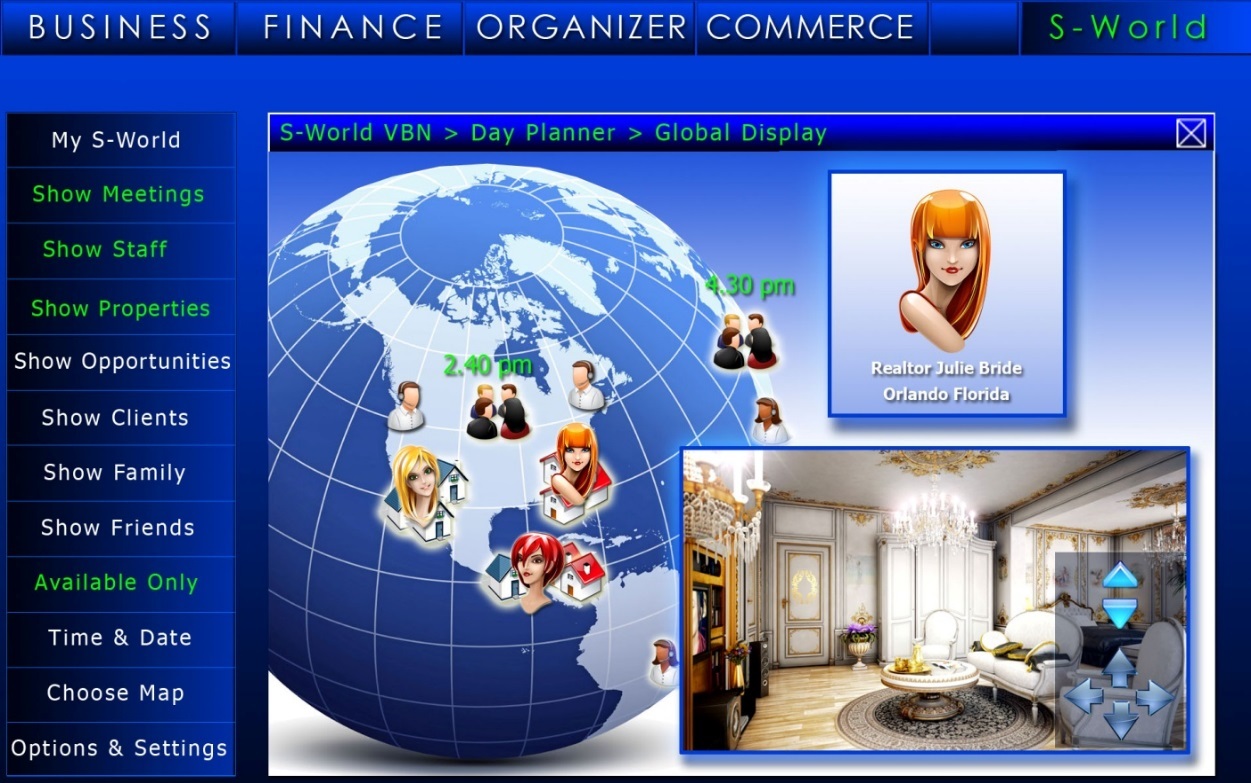
Up next is S-Web, a small mentioned point that would from 2013 to the current minute see more of my time that it took to write S-World.biz and American Butterfly parts one to four. Plus about 15,000 hours of my trusty team of developers in India. Thanks guys…
S-Web is Villa Secrets, or better put, Villa Secrets is the web framework that S-Web once wished to create. It is the founding pillar off M Systems
Here is the original idea which we started in 2009. Create a database driven website full of inventory and recreate and customise it for many companies, in the real example below the copy was Sotheby’s Realty Cape Town.
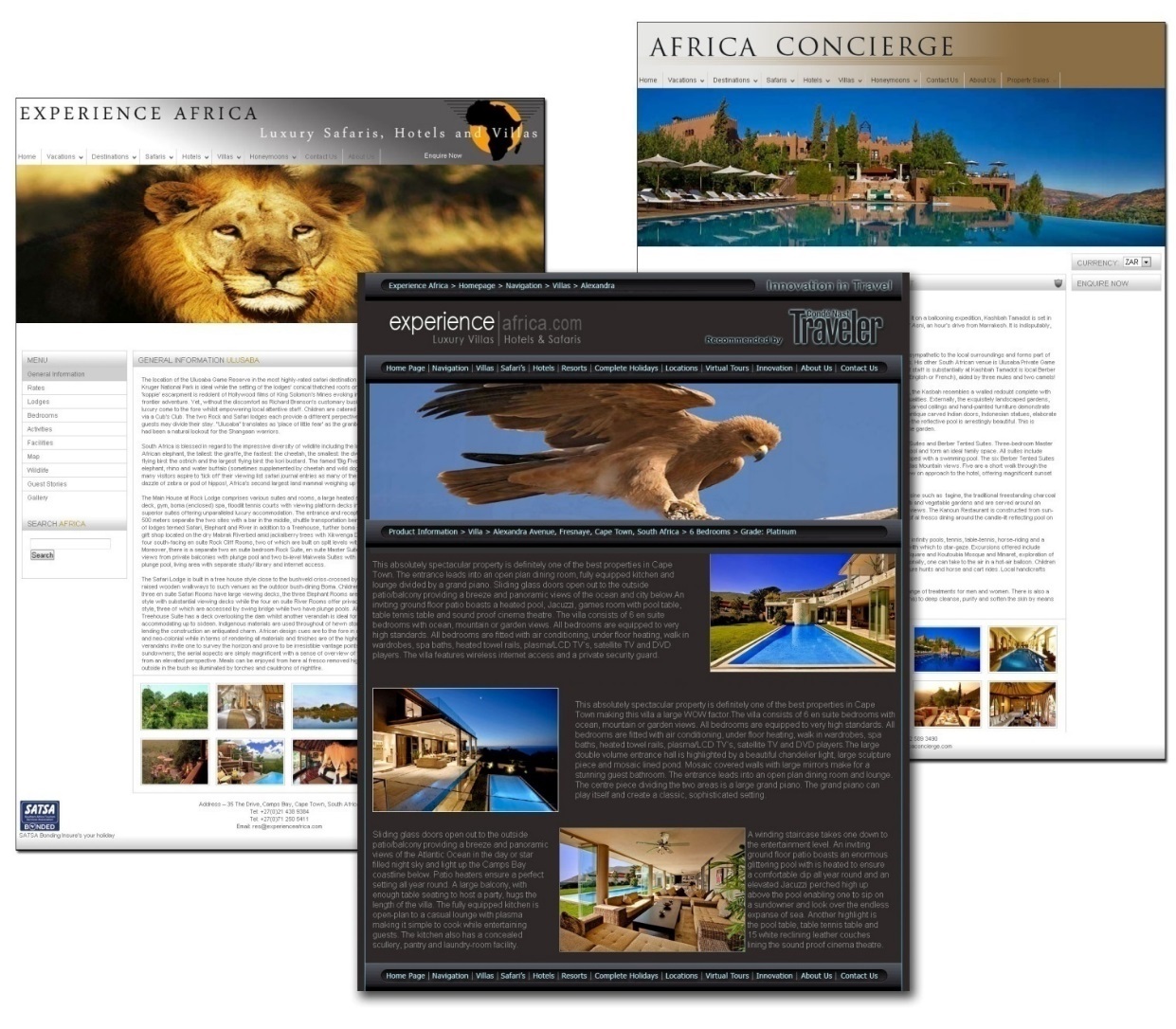
The chapter concludes with an early version of the TFBMS, (Total Financial, Business and Marketing System) the business workflow, the finance module the CRM (Consumer Relationship Management) and ecommerce and marketing. As then as is now, the difference between this and other systems is it is one integrated system, not a collection of applications.
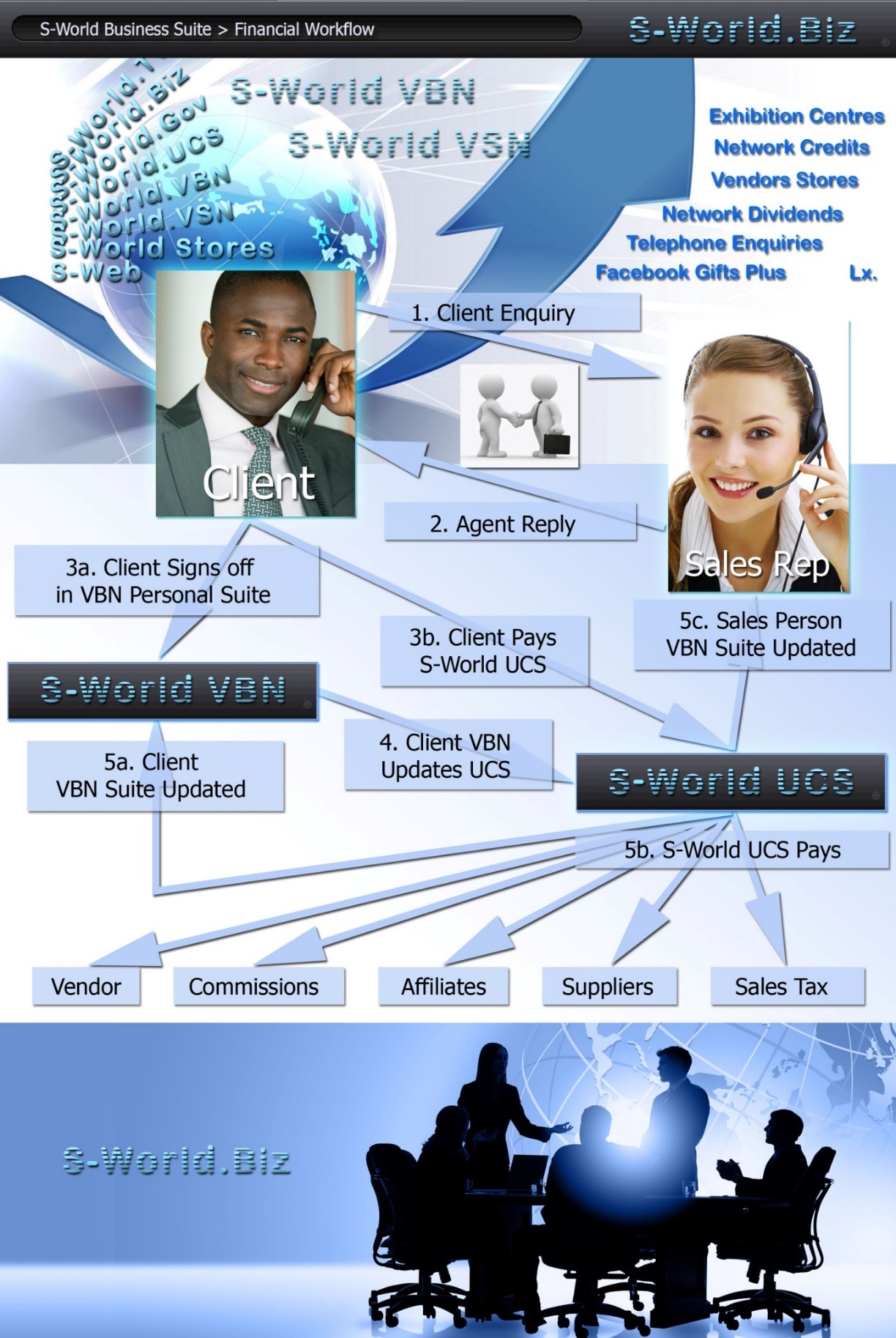
h. Chapter 8. S-World UCS (Universal Colonization Simulator)
Read/Download the full chapter on PDF
This chapter is retold in M-Systems Point 12, so whilst this chapter is arguably the most important, certainly in terms of physics and logistics, we will only present a quick summary and point out the 8 special projects that POP will fund.
Chapter 8 was not included in the first version of The Theory of Every Business. Before creating this chapter, American Butterfly book two ‘spiritually inspired software’ had already been written. The chapter was then compiled with hindsight.
The chapter had started off innocently enough. About the need to create a tutorial game to better teach the systems. A game that I had been considering since 2003, when I wanted to use the virtual tours we created to create a management system game like ‘Railway Tycoon,’ ‘Tropico’ with hits of ‘Civilization’ and administration more like ‘Champion Manager.’
The hook then as it is now is the game, which was then called Villa Mogul, would be based on a real business and playing the game well would lead to the opportunity of running one’s own business.
However, S-World UCS developed into advanced business strategies and the creation of EEE Points, which were assigned to each company based on their impact to society and the planet we live on. Encouraging companies to invest their POP overflow into strings and networks that would not necessarily be one’s finest choice. But doing so, as the increase in EEE points opened up other opportunities.
In addition to EEE points was QE Scores. A QE score considered ways to minimise financial black holes, by looking at all points to keep spending in the network. The score is created by the profit vs revenue a company achieves, plus the profit vs revenue their suppliers achieves, and the amount of money the staff spend that can be tracked. In the example given TWF (The Window Factory) has a score of 58.9% which means for every dollar TWF receives 58.9 cents will be made in profit by the network. It’s a figure that will make most economists say… No way, as currently big business average under 10%. However, this is not a standard business model. In S-World companies do not look to hide profit from the governments they work as pure profit making machines.
UCS Gameplay is then presented showing how a company uses the EEE points and QE points and how they bid for tenders, (which is created like a territory conquest game). It teaches the user how to deal with other companies then looks at POP investment. And is given a choice of new grand networks to choose from. But as it has not got enough EEE points it is only allowed to invest into a development that has some philanthropic or ecological development.
The Original Graphics follow
In this graphics we see how TWF (The Window Factory) can see QE stats of all suppliers and how by choosing suppliers with high QS scores their own QE score increases.
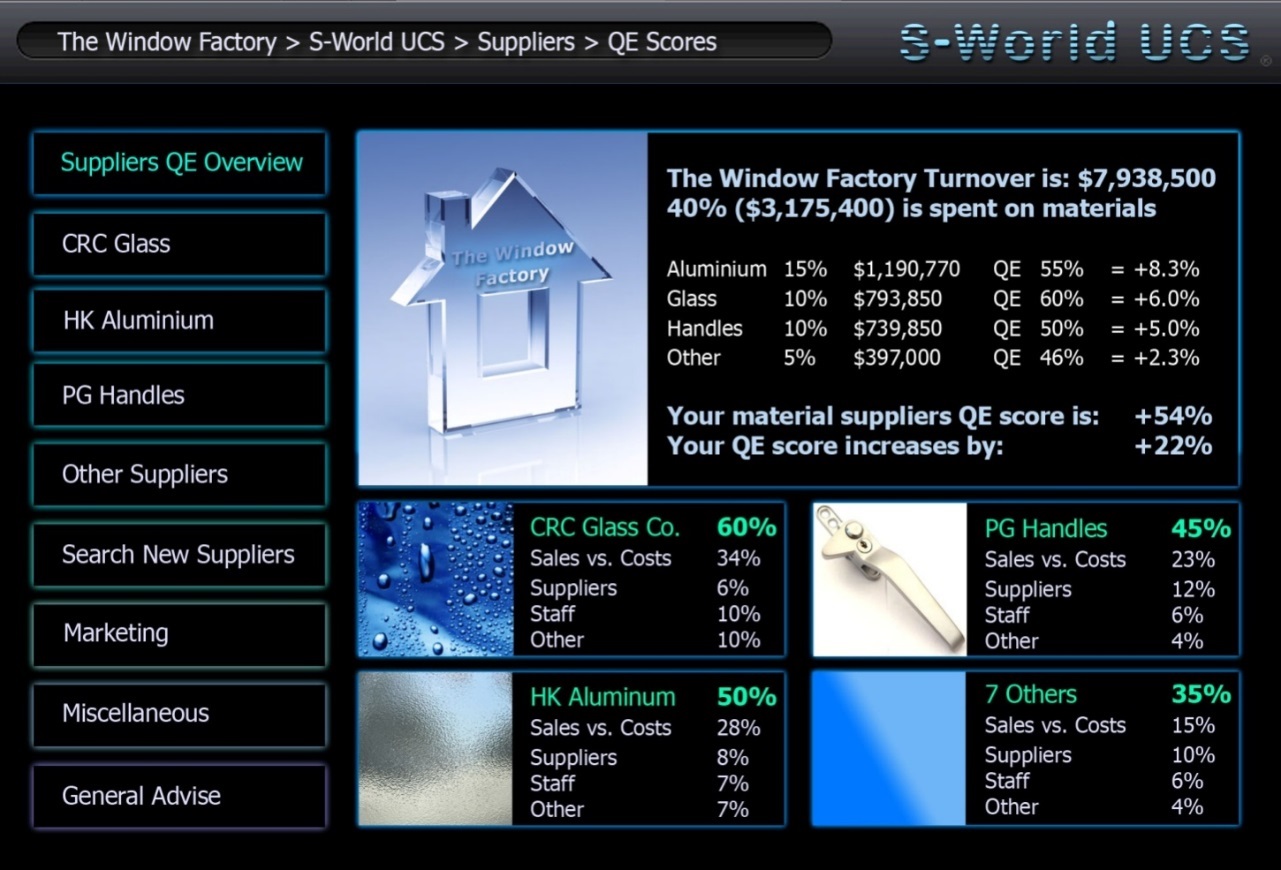
This is followed by their Staff’s QE Score
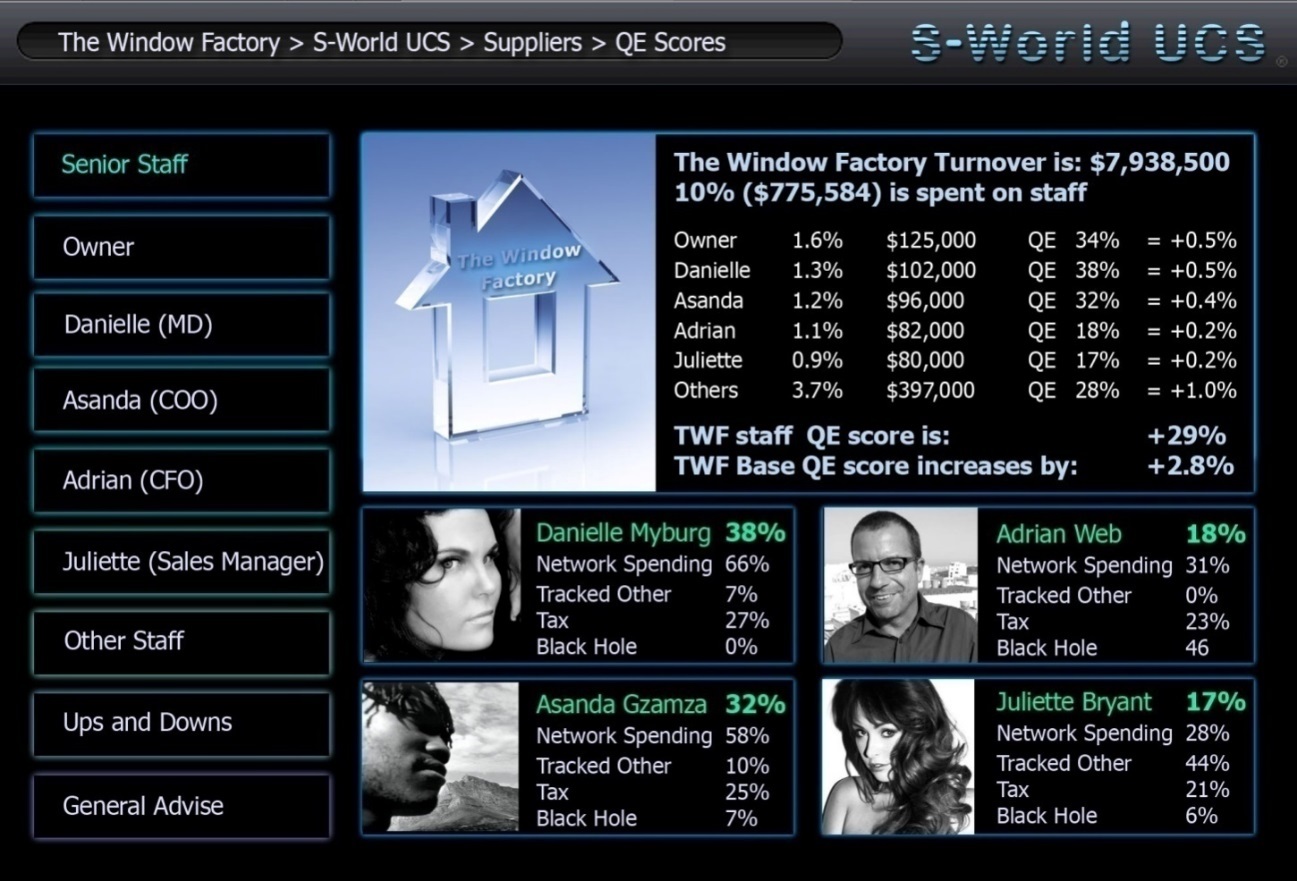
Next we show a company’s EEE score and how it is created from 9 different categories: Ecological, Gifts (Economic Stimulus), Research, Philanthropic, Sport/Media/PR, Systems Knowledge (S-World UCS), Consumer Ratings, Suppliers, Tax + Other.
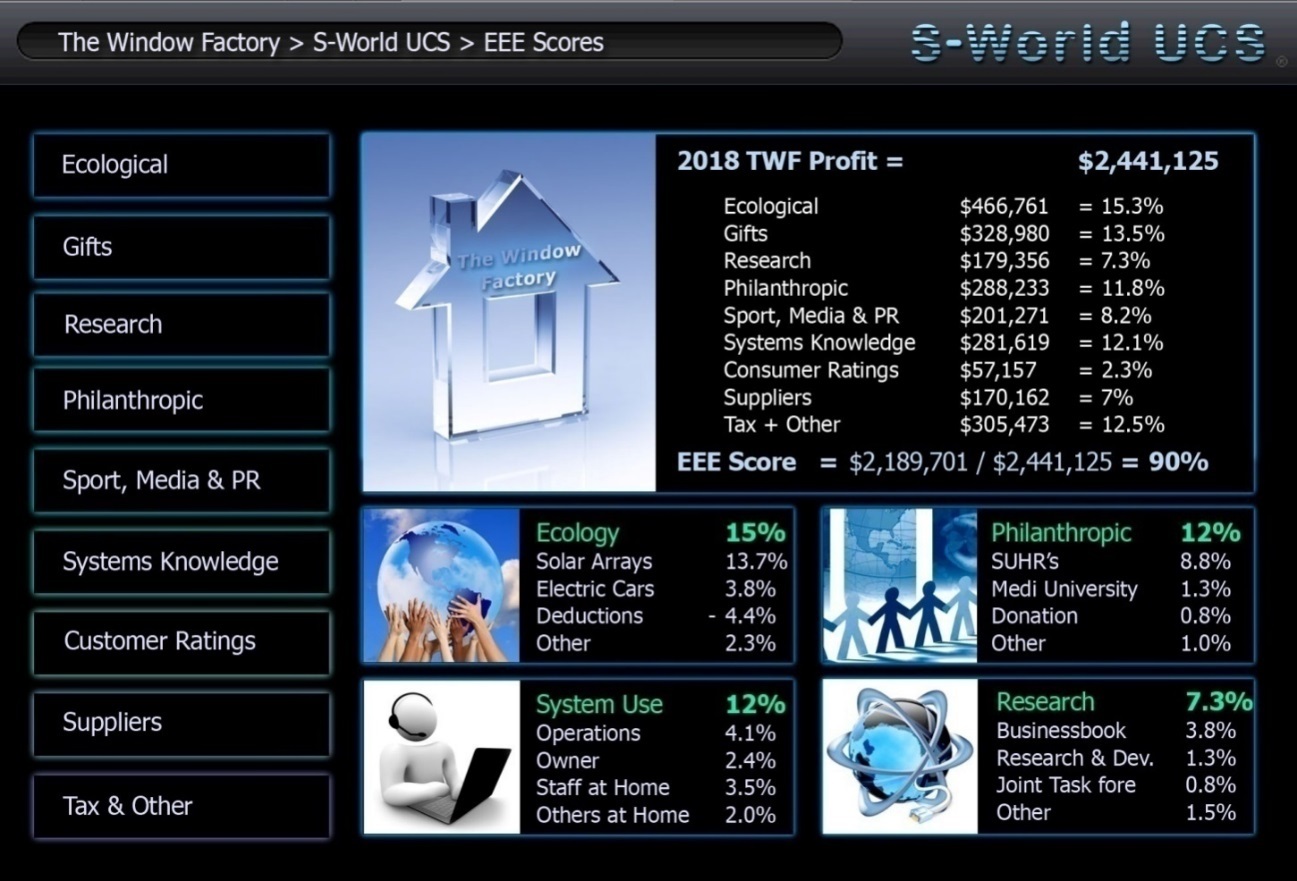
Next we move into the territory gameplay. We see the location of The Window Factories Resort, a breakdown of the 16 different locations in the Orlando String, and the 10 different locations in Florida (which are a part of 512 different locations in the USA and Canada).
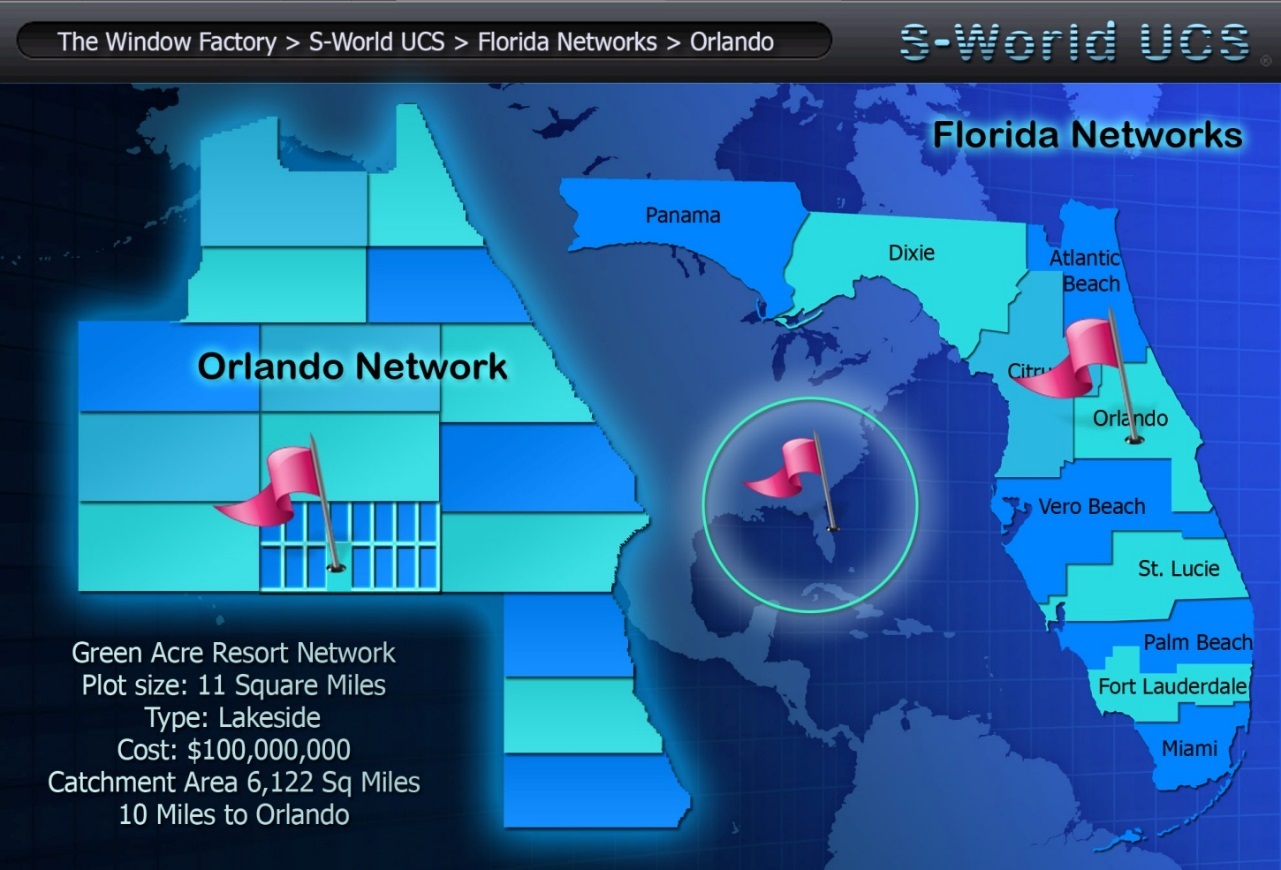
Below we see the tender process (The ‘Ť’ in the Susskind Boost) in which The Window Factory is presented with 2 substantial orders from within the state of Florida.
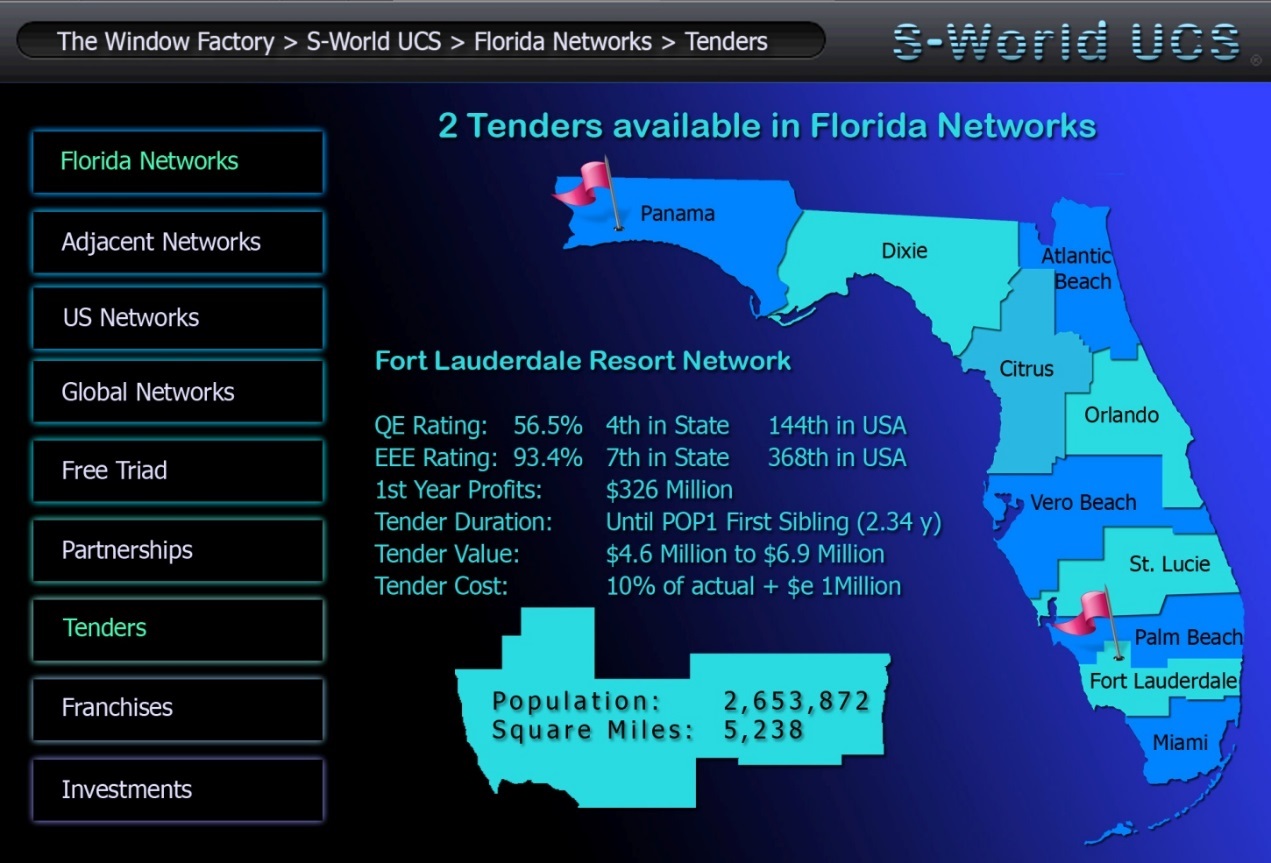
Next we have a look at one of the Tenders from ‘Sheer Windows.’ Who are likely to become the supplier of all windows for the Fort Lauderdale Resort Development (grand network) and require $2,000,000 worth of Aluminium Windows (Which in Florida are exclusively manufactured by The Window Factory).
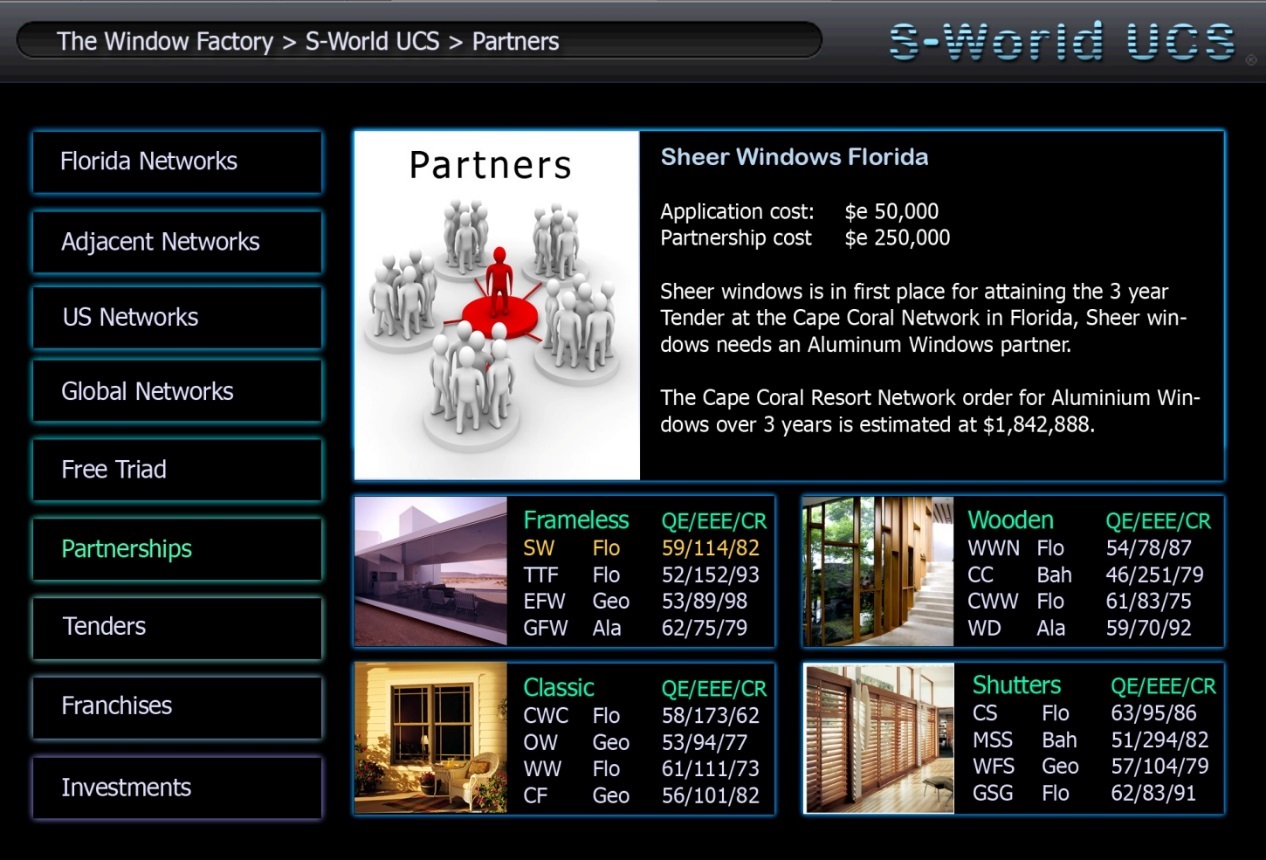
POP Expansion.
Alongside normal business trading is POP expansion where The Window Factory owner chooses where to invest the POP overflow revenue (See M-System Part 5 and 11).
Below we see the global options…
img src=”http://network.villasecrets.com/wp-content/uploads/2016/08/M_Systems_-_A__html_5c2e4fac.jpg” alt=”the-window-factory-ucs-franchises” width=”1297″ height=”881″ class=”alignnone size-full wp-image-3244″ />
But as TWF’s EEE score is below 100% it cannot bid for US opportunities.
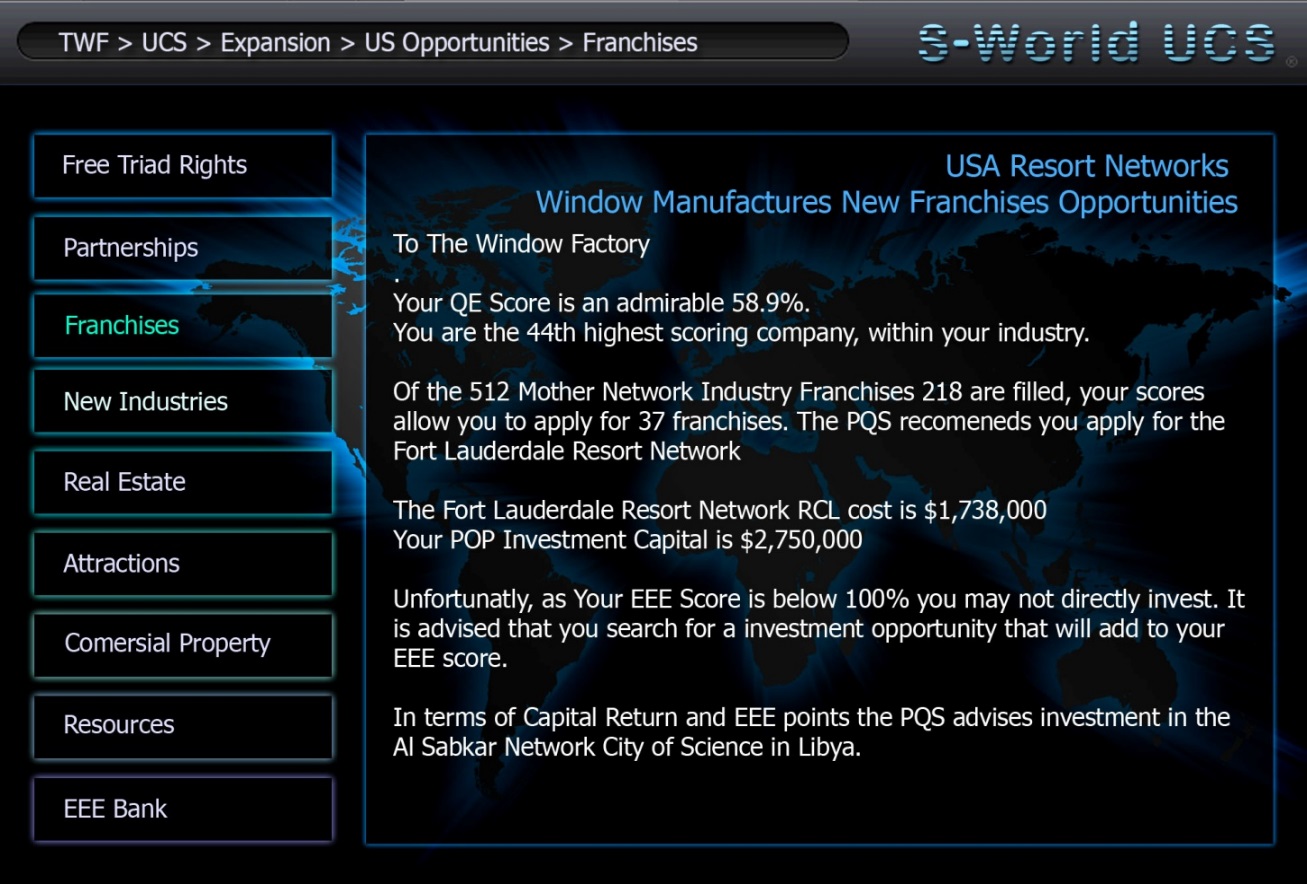
Below we see the options in Africa. The ones with a green shade are a part of the ‘African Rain’ Special Project and the red ones are philanthropic locations. Choosing either option will increase TWF’s EEE score to over 100% so they can choose the USA or Europe in the next round.
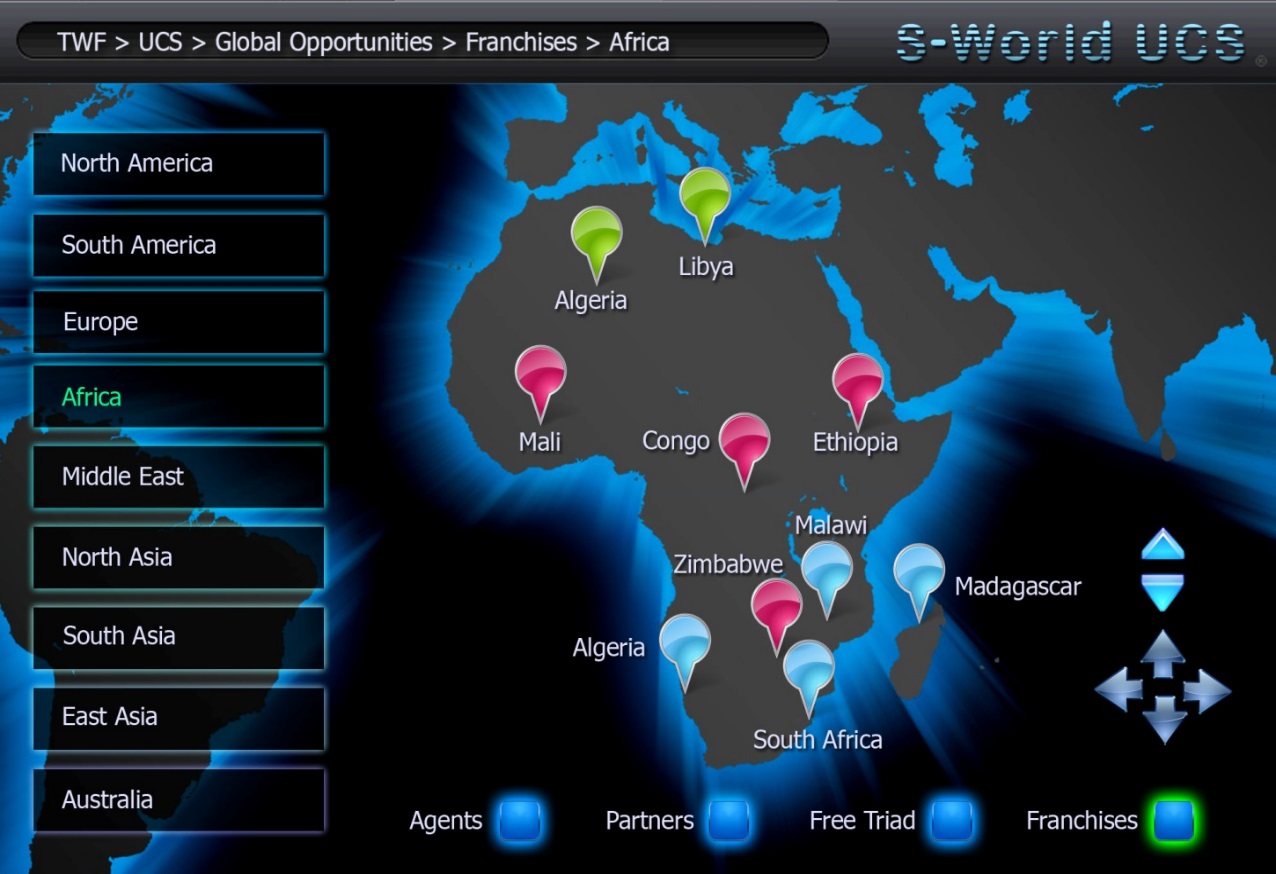
The user clicks the Libya icon and gets an overview of the Al Sabkah Network City (Which was in 2011 the first location chosen for a resort network and indeed was the inspiration for the creation of Resort Networks).
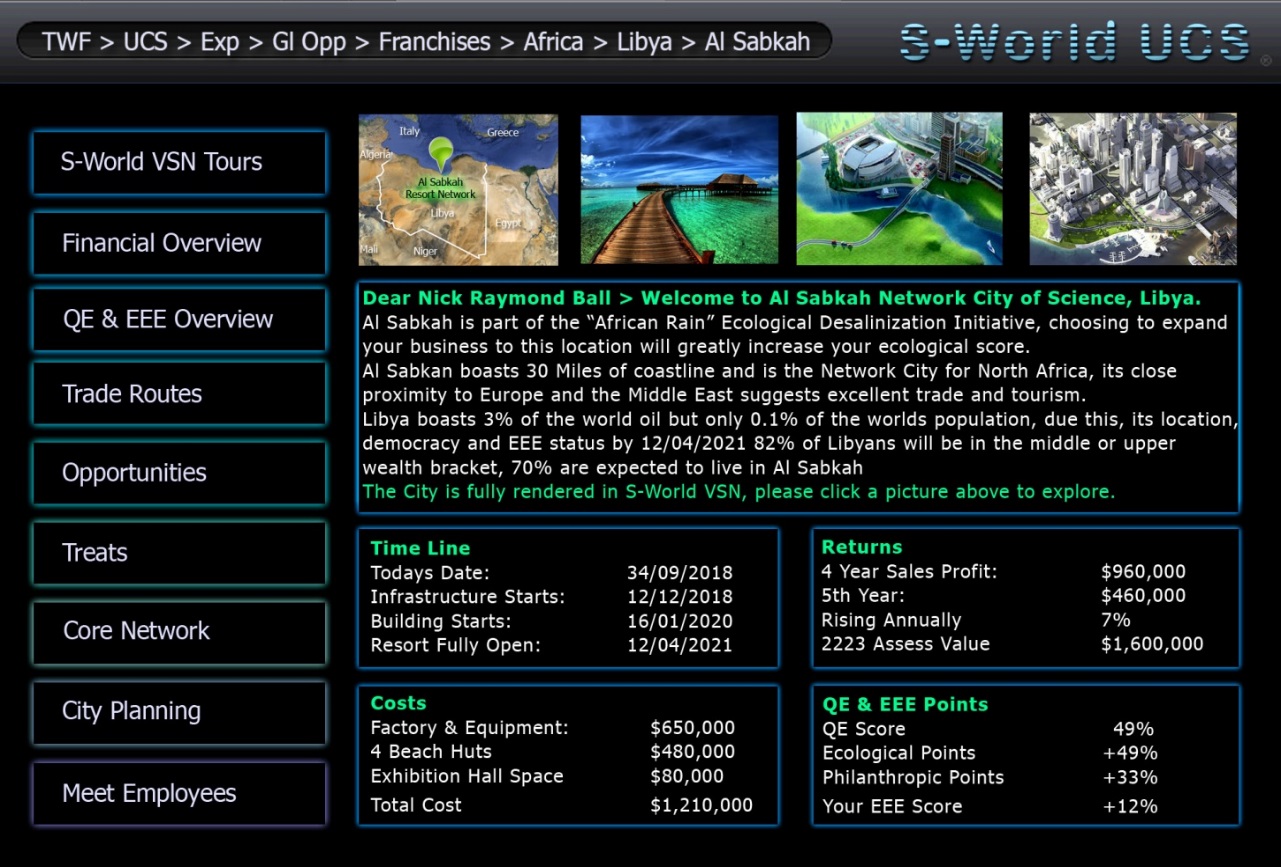
Al Sabkah Network City is different to a standard resort network. One square mile is given to 216 country and sub counties, where they build a mini city and a grand embassy. Below we see the US Sector (graphics courtesy of SIM CITY).
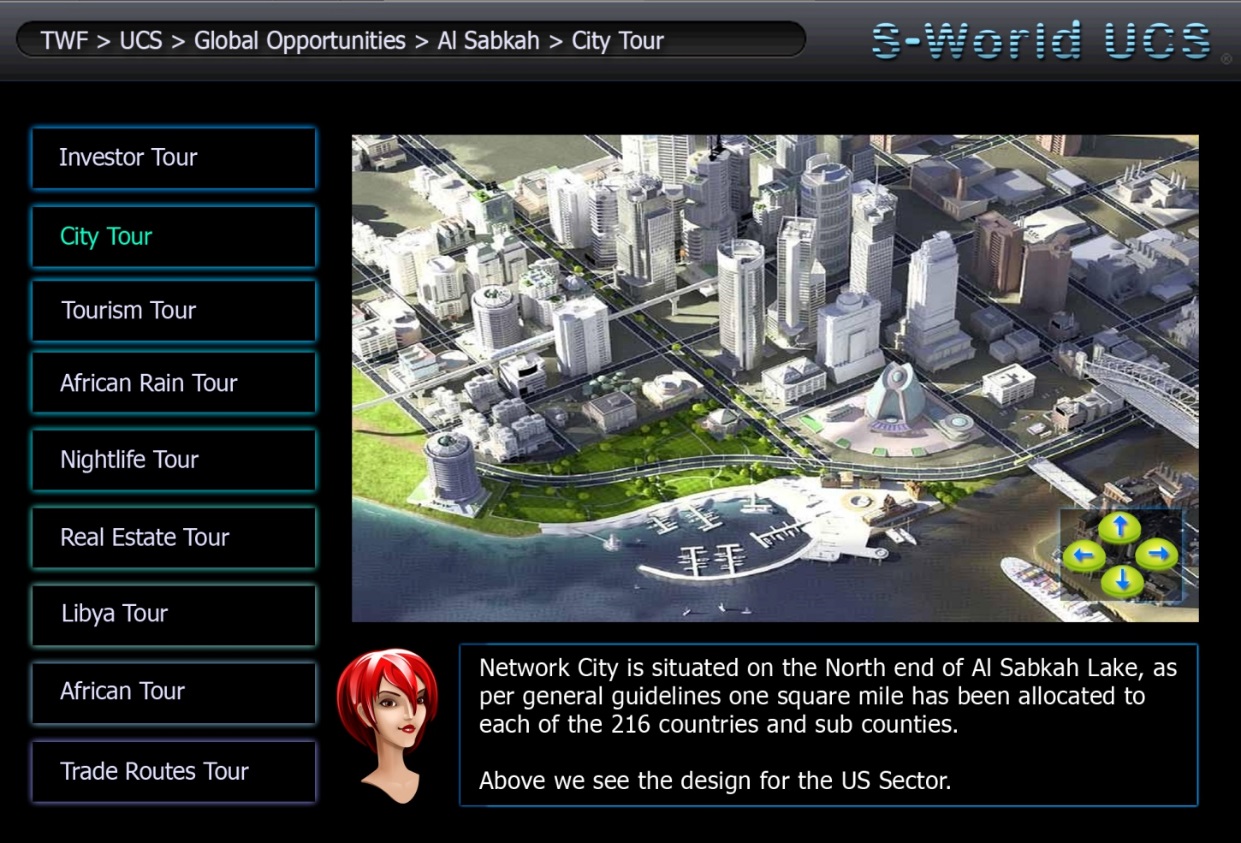
Within the city is an exhibition hall for construction companies.
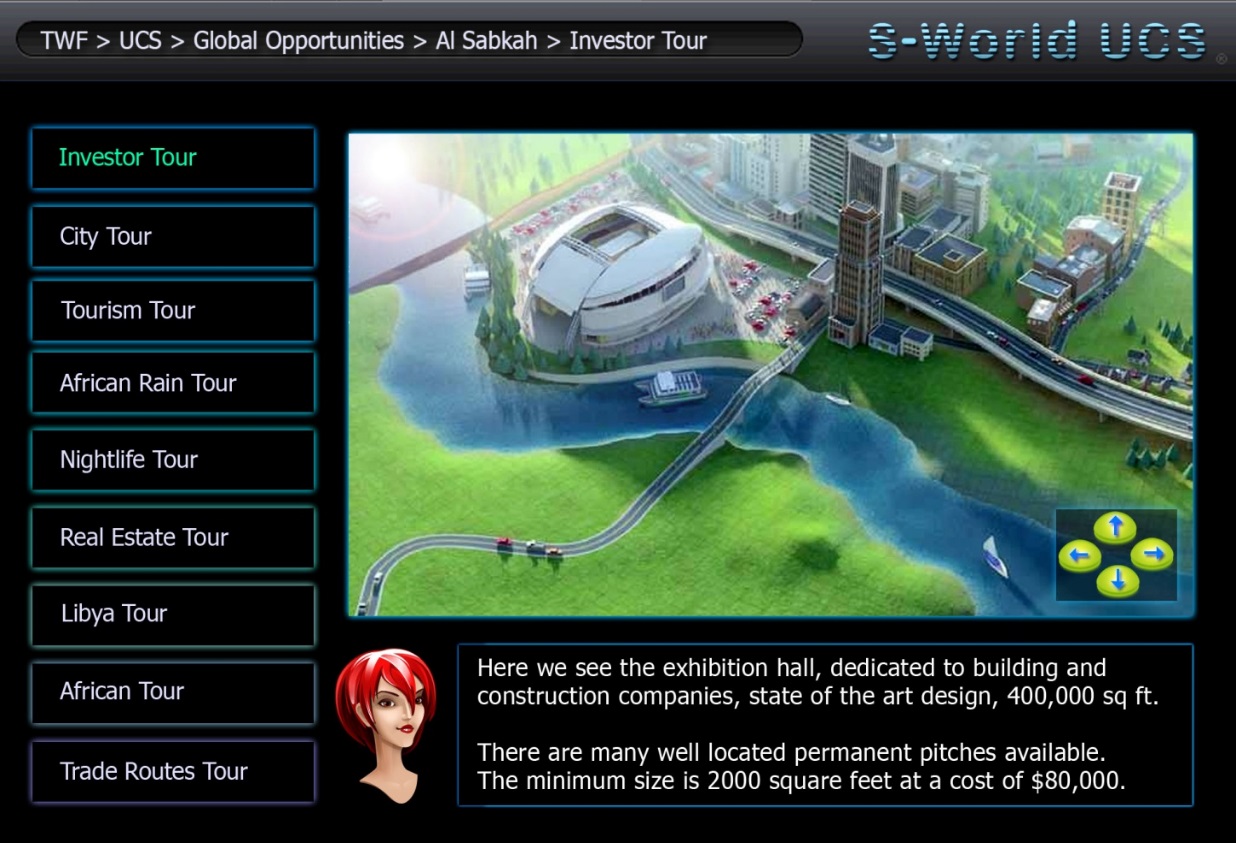
It is suggested that TWF’s investment should include a permanent pitch at the exhibition centre and build 4 beach villas on a man-made island on the Al Sabkah lake.
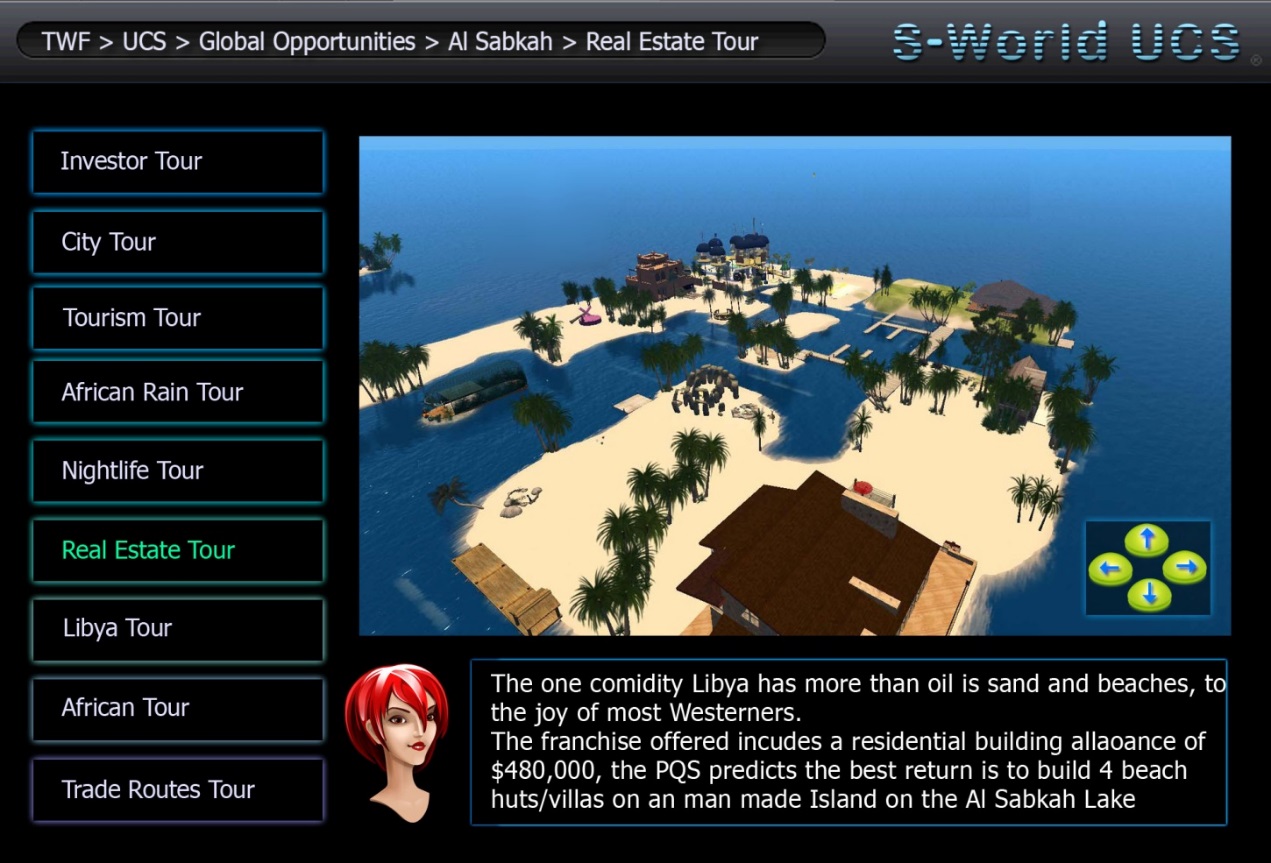
End of Extract
Next in S-Wold UCS we present the ecological and philanthropic special projects that alongside the ‘created as a part of the resort development’ projects in Chapter 3 are the motivation behind American Butterfly, The Theory of Every Business, M-System and Angel Theory. And are the reasons why I decided to make S-World a non-profit project. As the money, that would have gone to me, instead funds the projects.
Practically in the now (12st August 2016) the projects are funded by the 25% of gross profit contribution after each company has reached its POP point (See M-System 5).
What follows is the original article…
Note that in S-World economics the more expensive a project, the more sustainable the economy. And that in M-System Point 14 ‘Angel Cities,’ we create these projects as complete in 2080, then working backwards to create threads and paths then back to our current day network designs, then follow the paths to successfully implement the projects.
S-World UCS – Special Projects
Recruiting aside, the UCS gameplay is based around the tremendous wealth that can be accumulated by the collective network companies and the creation of “Special Projects.”
Not only are “Special Projects” noble endeavours that will either assist the human race or protect it, “Special Projects” are a significant branding exercise for whoever undertakes them. Special Projects in whatever form install pride and give unity to those that undertake them, assisting to unite the fractious global population to a common cause or indeed causes.
To our right we see the entry page to the S-World UCS “Special Projects” page, with eight projects identified.
1. African Rain: The ambition to return the Sahara Desert to it pre-Roman state of fertility via solar powered desalinization initiatives.
(1b.) The Babylon Project: Looks to follow a similar root across the Pakistan, Afghanistan, and Iranian borders, and further invest in infrastructure and the creation of cities schools and hospitals. This project is in exchange for nuclear disarmament.
2. Solar Moon: Looks at generating solar power from the moon and sending it via microwaves to earth, which if facilitated (infrastructure and transport provided) can be 30 times cheaper than building solar arrays on earth.
3. Planetary Defence: Aims to protect the world from asteroid collisions.
4. Mission Gliese: Given enough capital, it is possible to reach the nearest habitable planet “Gliese 581g.” Problems with artificial gravity aside, if one had near limitless money, we have the engineering skills to build a ship that could house 1000 nuclear engines an ark and drilling equipment to build underground cities, in case after arriving there is no atmosphere. If the ship was suitably armoured against asteroid hits, at a “guess” in a vacuum with no resistance, getting ever faster it could hit 50% of light speed within a few years. As such, given 20 years to make it, it’s possible I and many others could get there within or lifetimes.
This “Special Project” becomes the flagship unity branding excursive, and is this project that gave “S-World Universal Colonization Sim” its name.
5. The Poverty Line: Seeks to bring all of earth’s citizens above the poverty line, or to be specific all citizens within countries that have adopted adequate measures and teachings to stop population growth above the poverty line.
6. Global Cooling: Stopping the use of fossil fuel alone will not stop global warming. It will just slow it down. The only way to cool the earth is to produce more oxygen than carbon dioxide. In short plant lots of trees. This project falls hand in hand with “Solar Moon,” African Rain” and “The Babylon Project.”
7. The Yellowstone Lid: Seeks to dig a gigantic trench around and a sequence of giant containment structures over the Yellowstone Super Volcano, which is due to erupt soon, indeed it’s late. If the Volcano erupts it will be an “ELE” Extinction Level Event, this project may take 5000 years to complete. But is best started as soon as possible.
8. Middle Earth: Other than protecting ourselves or colonizing space, the only way to ensure survival of society on our planet in the case of and ELE, is to build underground cities and eco zones under the Networks. These can at first act as 365 days a year tourist resorts. But over time become a genuine safe-haven in case of an ELE. It also a part presents a solution to overpopulation. The technology used in this process will be useful in universal colonization. If one has heat from the core of a planet, one can make light, with light one can make oxygen. There is no reason why an underground series of networks on Mars could not flourish.
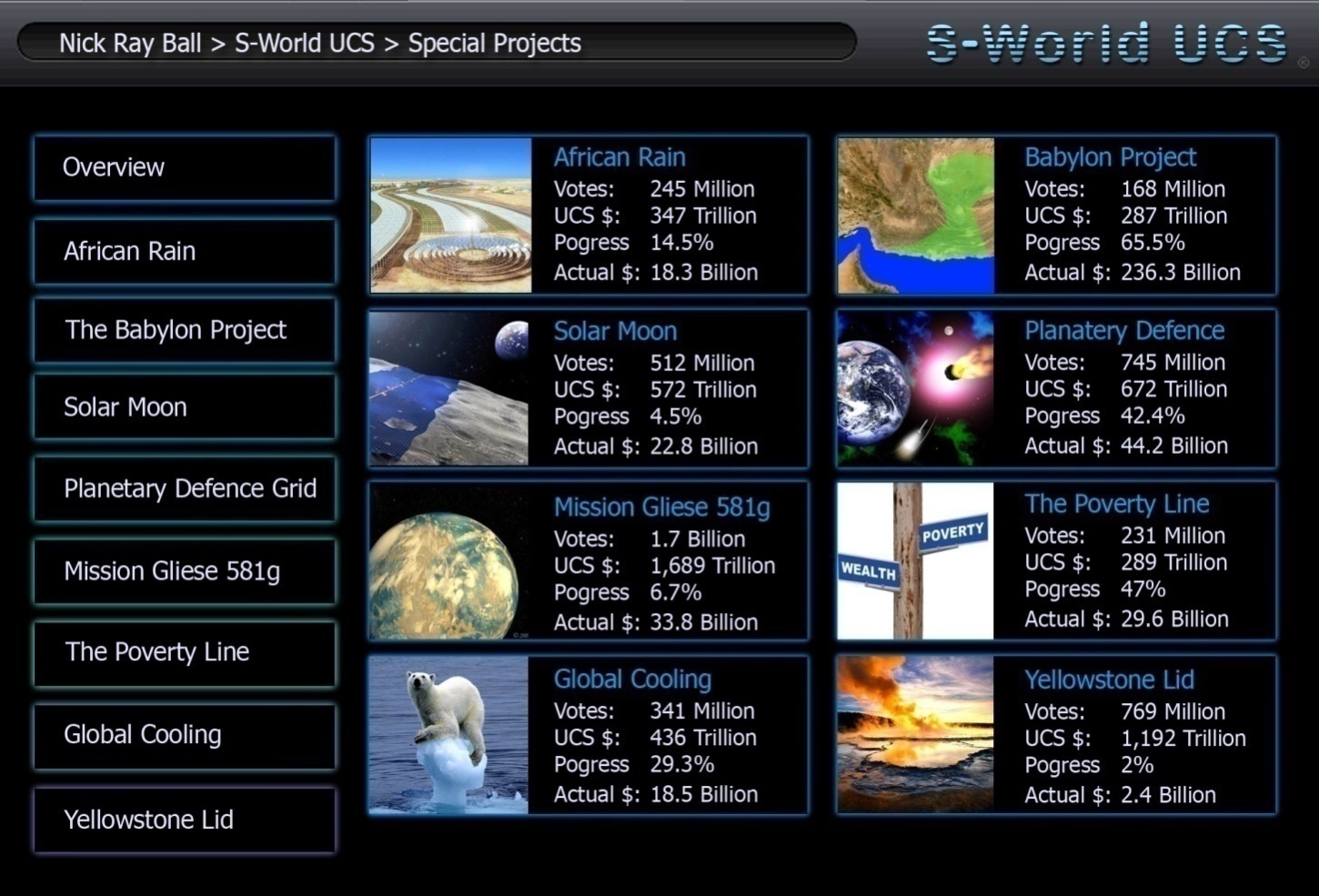
Next to the pictures are 4 text fields.
1. Votes: Indicate the amount of UCS game players that have started the project.
2. USC $: Indicates the amount of e$ (“game” dollars) that the UCS users have communally spent on each project.
3. Progress: Indicated the real life progression to stage one of the operations.
4. Actual $: Indicates the real life total investment spent on each project. Many projects such as Global Cooling and “The Poverty Lines” are automatically funded by the Give Half back “POP” process, others see funding from Angel POP.
End of Extract.
What happened next changed the focus of the project to include higher mathematics as a fundamental building block within the network design.
This game changing event was watching Garratt Lisi’s 2008 TED lecture on The Theory of Everything”
http://www.ted.com/talks/garrett_lisi_on_his_theory_of_everything.html
The chapter continued…
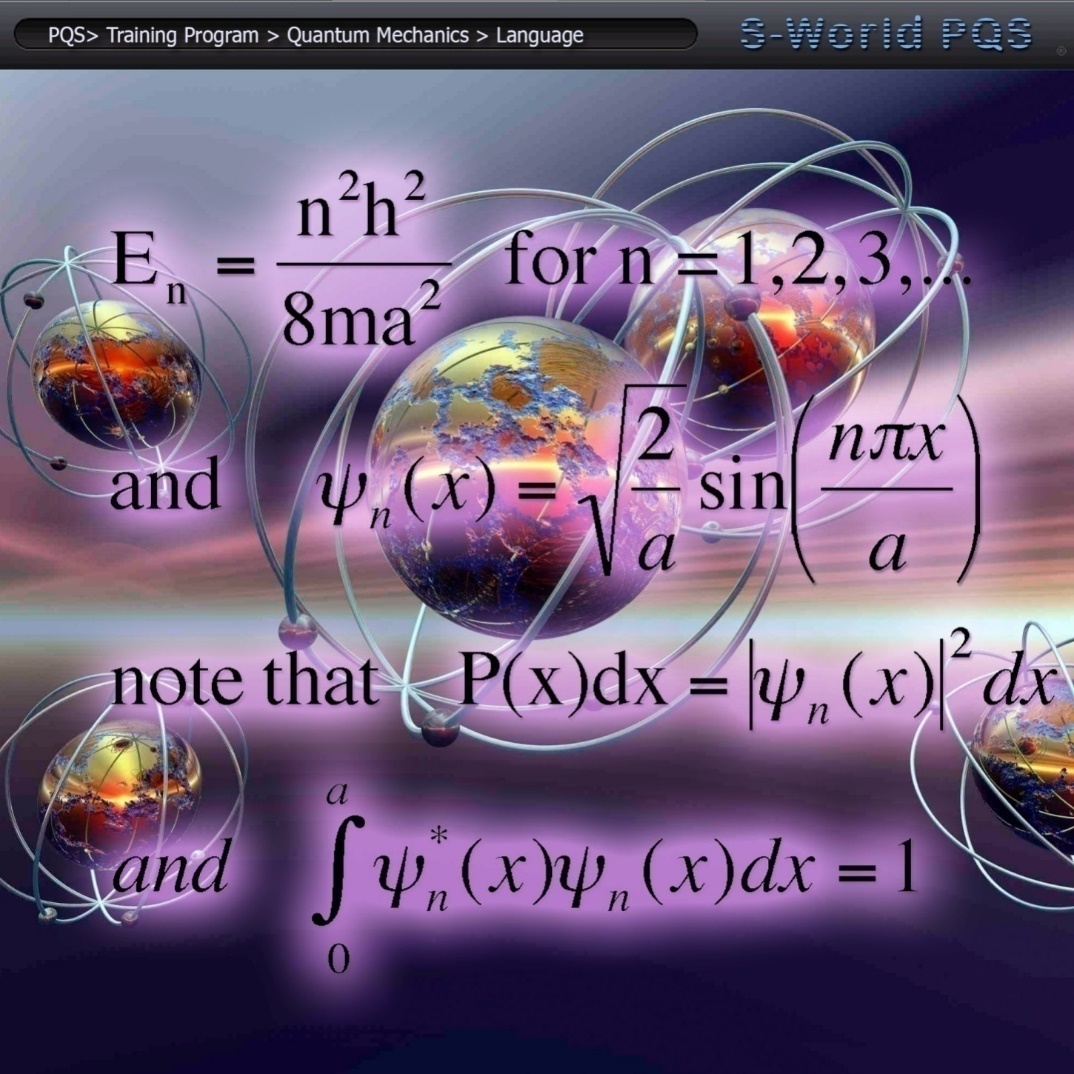
I can’t read this!
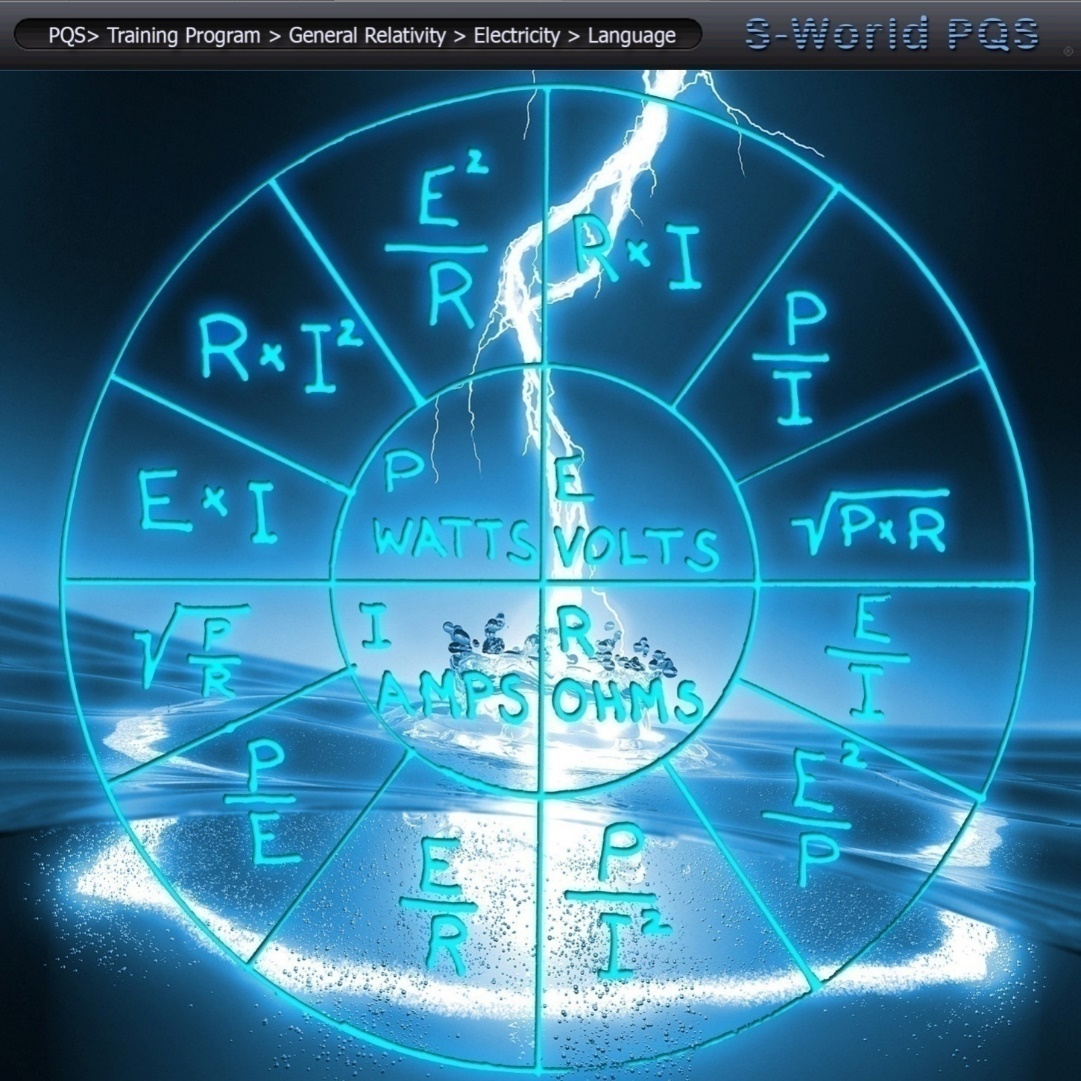
Or this!
But do we need to read this language?
Of course we don’t. That would be like saying there is no point in doing business with China if you don’t speak Chinese. The first equation was specific to Quantum Mechanics but it’s the second that makes the point as the second was specific to “Electricity.” You do not have to understand the language of electricity and its equations to use a TV set. All you need to know is where the plug point is (Retrospective note, Electricity or specifically Electromagnetism is also quantum mechanics).
We have seen some fundamental aspects of S-World UCS. However to fully appreciate its capacity to improve the network and to make the creation of Special Projects a reality not just a hypothesis, we need to know a little more about quantum mechanics care of Garret Lisi from the opening section of his 2008 TED lecture.
Quantum Mechanics by Garrett Lisi
It starts with a blackboard full of equations, Garrett says: “Woh, dude, check out those killer equations, sweet! But follows with…
‘Actually, for the next 18 minutes I’m going to do the best I can to describe the beauty of particle physics without equations.
It turns out there’s a lot we can learn from a Coral. A Coral is a very beautiful and unusual animal. Each Coral head consists of thousands of individual polyps. These polyps are continually budding and branching into genetically identical neighbours. If we imagine this to be a hyper intelligent Coral, we could single out an individual and ask him a reasonable question. We could ask “how exactly he got to be in this individual location compared to his neighbours, if it was just chance or destiny or what?”
Now, after admonishing us for turning the temperature up to high, he would tell us that our question was completely stupid. These Corals can be kind of mean you see, I’ve surfing scars to prove that. But this polyp would continue and tell us quite clearly that his neighbours were identical copies of him. That he was in all these other locations as well but experiencing them as separate individuals.
For a Coral branching into different copies is the most natural thing in the world, unlike us, a Coral would be uniquely prepared to understand Quantum Mechanics.
The mathematics of Quantum Mechanics very accurately describes how our universe works and it tells us our reality is continually branching into different possibilities, just like a Coral. It’s a weird thing for us humans to wrap our minds around, since we only get to experience one possibility.
(Note in the following example Lisi has swopped the Erwin Schrödinger place with his cat, usually it is the cat that is in the box.)
This quantum weirdness was first described by Erwin Schrödinger and his cat. Schrödinger is in a box with a radioactive sample, that by the laws of Quantum Mechanics branches into a state that is radiated, and a state that is not. In the branch in which the sample radiates, it sets of a trigger that releases poison and Schrödinger is dead, but in the other branch of reality he remains alive. These realities are experienced separately by each individual, as far as either can tell the other does not exist.
This seems weird to us, as each of us only experiences an individual existence and we don’t get to see other branches. It’s as if each of us like Schrödinger here, are a kind of Coral, branching into different possibilities.
The mathematics of Quantum Mechanics tells us, this is how the world works at tiny scales and it can be summed up in a single sentence:
“Everything than can happen, does”
That’s Quantum Mechanics.
End of Garret Lisi’s section (thank you Garret)
Below we see a Graphic from American Butterfly part. 2: “Spiritually Inspired Software”
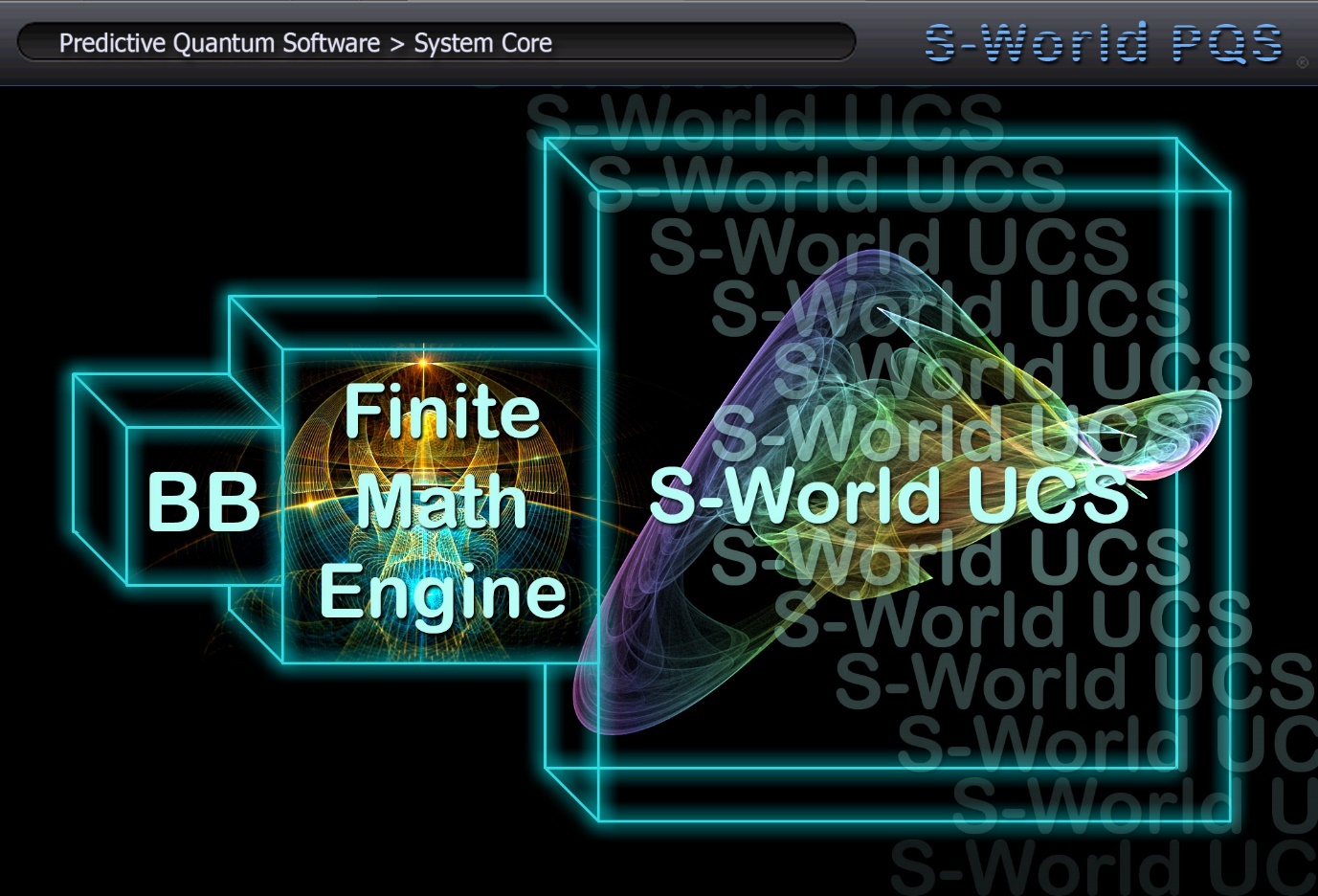
1. SW = S-World; all who work directly for S-World, inducing university, research and operation centre staff.
2. FME = Finite Math Engine; represents the usage of CFM “Compatible Finite Math,” RES “Revenue x Efficiency x Spin” and the POP “Pressure of Profit” investment and number management systems, covered in books two and three.
3. UCS = Universal Colonization Simulator; network staff and businesses, UCS game/simulation players, businesses and people who wish to work or partner with the network, S-World VSN (Virtual Social Network) users, S-World.biz users, S-Web users, partner social networks users and S-World environment users.
Quantum Time
Without being able to understand the equations of Quantum Mechanics, and without really having the first idea what Quantum Mechanics was, Garratt’s explanation of the coral, creating identical copies of itself where “each individual was in many other locations, experiencing them as separate individuals,” saw the S World UCS light bulb flash.
Garrett’s lecture became the tipping point where the plans for a simulated game and business software became a way for the businesses within the network to replicate the quantum theory model and so be in many different places at the same time. As each individual UCS game player was in effect an identical copy of the business experienced by another individual.
As the data from all scenarios were available for analysis by the primary/actual business when using the S World UCS, network businesses like coral, are uniquely prepared to understand quantum mechanics, or more to the point benefit from quantum mechanics.
Shortly after considering the different users of UCS as proverbial corals in Garrett’s presentation, the idea came to create a copy of the UCS game/simulation/database. And send it forward in time, at double speed, so a month in our time was two weeks within UCS. This simulation was given the name UCS Voyager, within half a year of our time, Voyager would be a year ahead, and so on.
This Voyager simulation would always have to stay true to real life events and would update when actions happened. A typical example would be in the gaining of partnerships and tenders. If The Window Factory has fifty persons playing, it would have fifty different UCS futures, and at some point each player updates to the actual path that was taken, if their scenario had differed.
With fifty or so “human” futures, plus far more simulated by the PQS software, the owners and decision makers within the businesses can see where success is and take the necessary steps to enact the result. At the same time avoiding messy, or simply not as good outcomes.
Alongside UCS Voyager, fixed time simulations could be programmed and manned in the Future. If we look at our next graphic for the PQS “Predictive Quantum Software,” in this graphic, alongside the S-World software family, QuESC, the MCQPS and the UCS Registry, we see PQS Voyager 2046.
This simulation becomes the “Heaven on Earth.” Where a future is programmed to include all of the ideas of S-World: Angel POP, Special Projects and a supercharged economy. From which point it is reverse engineered back through various stages in time, to meet with real time, in such a way that Voyager 2046 is an achievable target.
From Voyager 2046 we see where networks will be built, the allocation of tenders and the creation of Special Projects not yet underway.
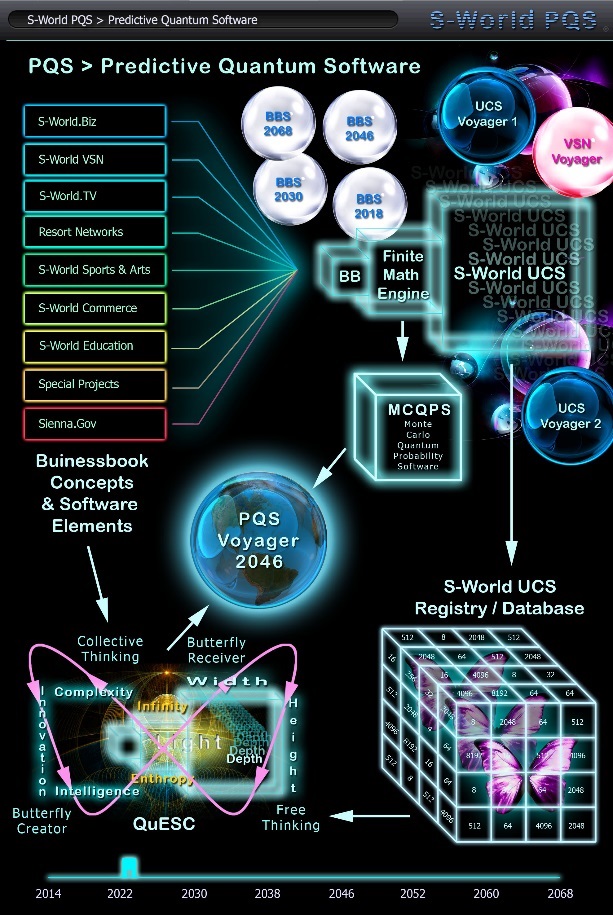
(Above we see the original 2012 PQS design, in which the BBS bubbles are now the M-System 14 Angel Cities)
In S-World-UCS We could create a simulation of the network in the future, which is a heaven on earth with everything as it should be. Then reverse engineer it back to our timeline, and enact it.
This concept was directly in line with the founding future looking philosophy which inspired the search and integration of elements of physics within S-World Isaac Asimov’s ”Psychohistory”:
“You may not predict what an individual may do, but you can put in motion, things that will move the masses in a direction that is desired, thus shaping if not predicting the future.”
As a result, the S-World UCS Mantra was created, and for the first time since the discovery of POP another element of physics influenced the programming of S-World and in so doing added significant strength.
S-World UCS
What if you could look to the future and see millions of eventualities for actions you take today?
What if you could use the information to assist today?
What if you could do this from your phone, TV or laptop?
Welcome to S-World UCS
Welcome to your future
The consideration for the above was to use S-World UCS as a gigantic quantum mechanics experiment, with us representing the coral and recreating a copy of the Network and sending it forwards in time.
We could create a simulation of the network in the future, which is a heaven on earth with everything as it should be, then reverse engineer it back to our timeline, and enact it.




















